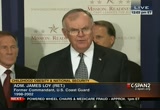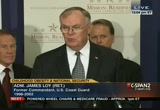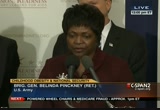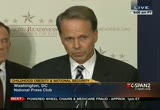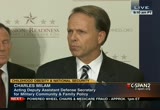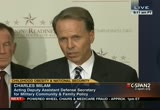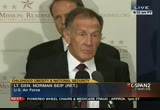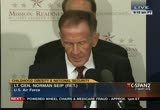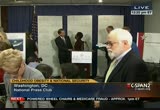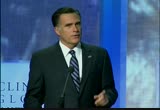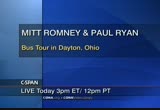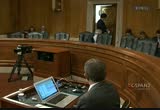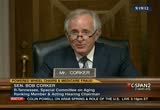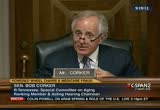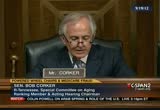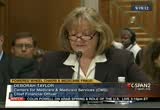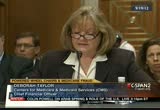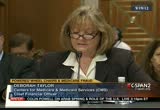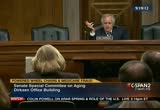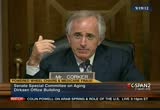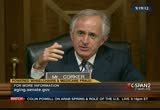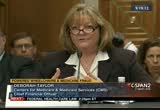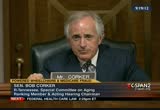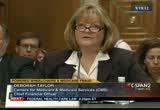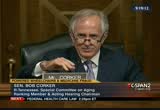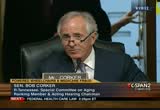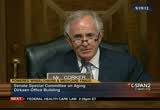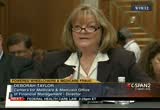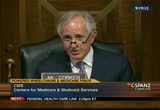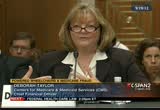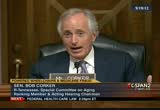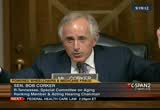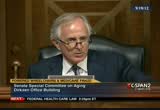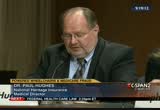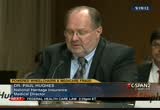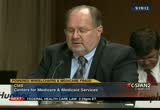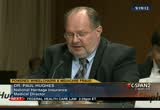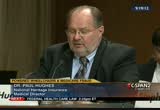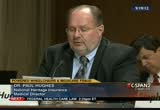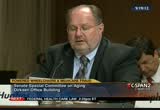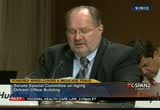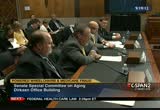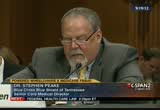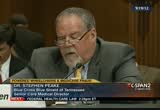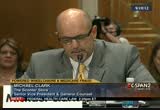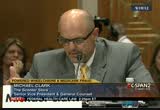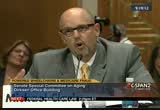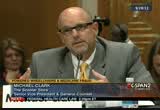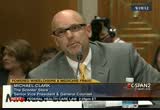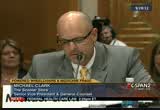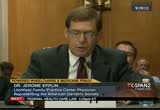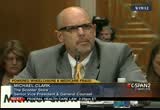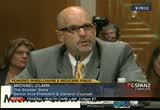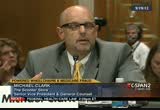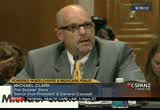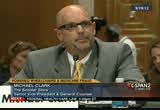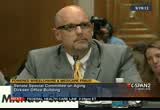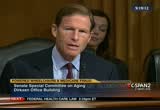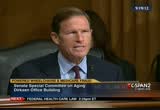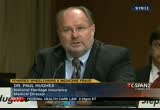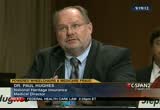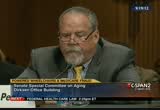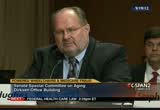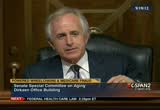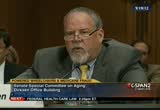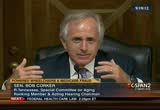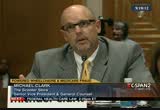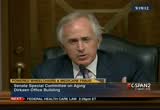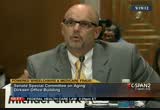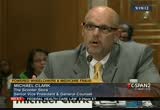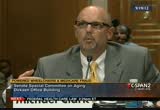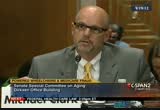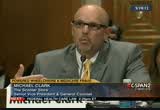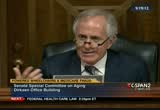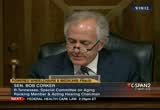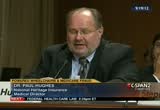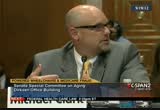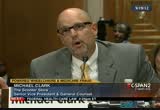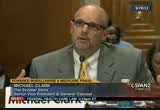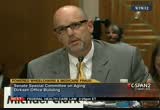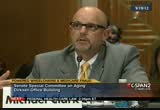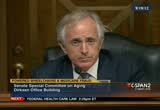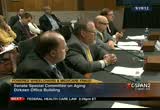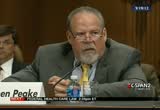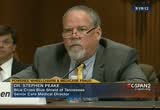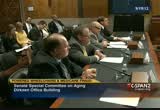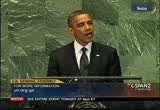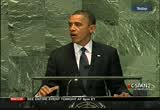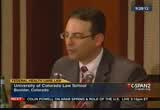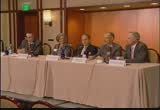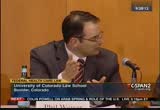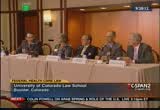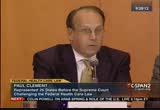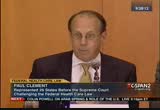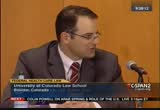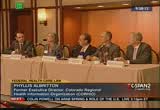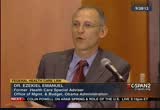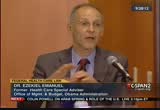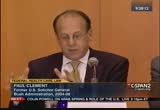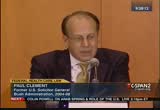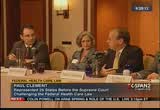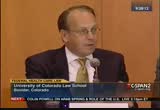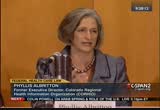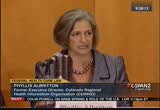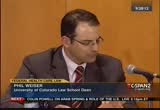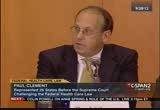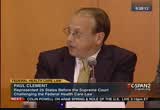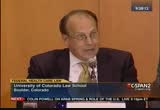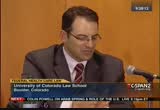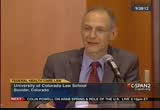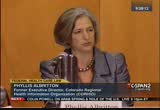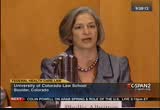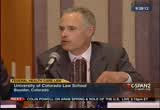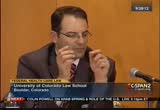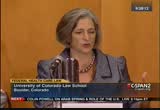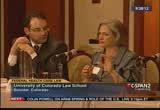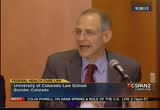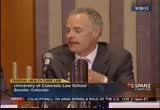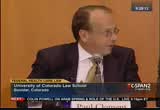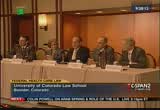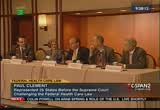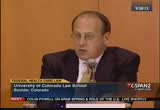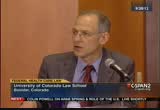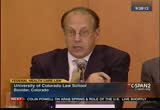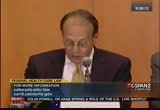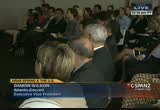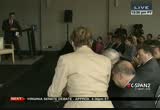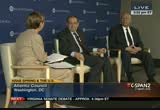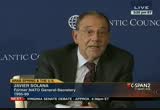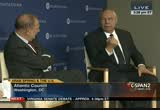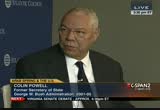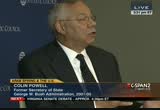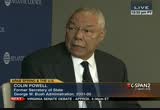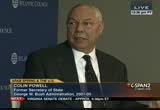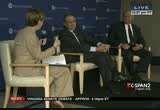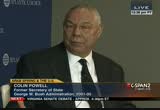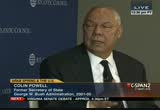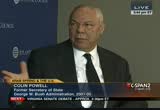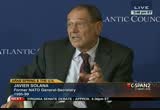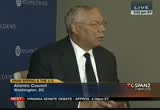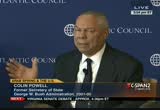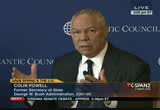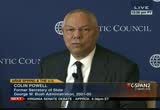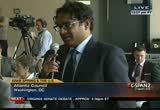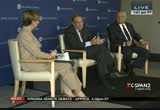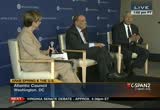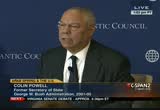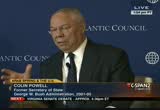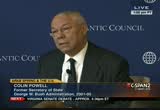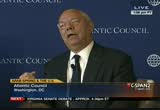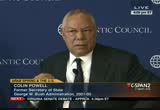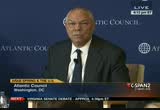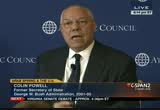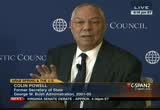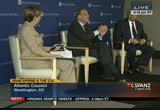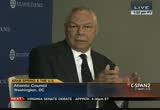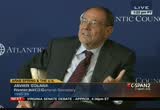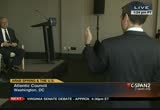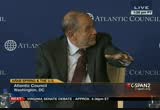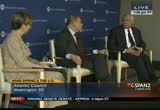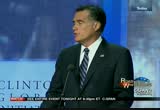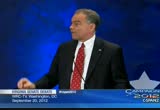tv U.S. Senate CSPAN September 25, 2012 12:00pm-5:00pm EDT
12:00 pm
mission readiness. >> not to start before the communications director. it is great to see you all today. we appreciate you turning out. a lot of familiar faces. [inaudible conversations] >> good afternoon. my name is amy dawson taggart, national director of mission readiness. non-profit national security organization of 300 retired generals and admirals who care about the national security of this country and support the smart investment to ensure a strong defense down the road. take this opportunity to turn off your cellphones.
12:01 pm
thank you. joining us today, four distinguished military leaders and representatives from the department of defense. very concerned childhood obesity poses a real threat to our long-term national security. let me introduce our speakers. general richard myers served as chairman of the joint chiefs of staff from 2001-2005. admiral james loy, u.s. coast guard retired. former deputy u.s. secretary of homeland security. the attendant general norman seip brigadier-general belinda pinckney and mr. charles milam, acting secretary of defense for military community family policy. our first speaker will be admiral james loy. we will take a few questions from the me after all the speakers conclude and we will segway to 1-on-1 interviews.
12:02 pm
thank you. >> good morning to you all. thank you, amy and thank you for use -- for your personal commitment to this cause. if you think this is difficult, try 300 general officers. thanks to the leadership of amy's team we made good progress over the last several years. two years ago our initial reports prompted the tension and properly so. the report added pressure to the effort to set nutritional standards and school menus across the country. those standards are in the process of being made into action today. today's report recognizes our kids have other sources of things to eat during the school band challenges government authorities in the process of affecting standards to set equally strong standards for what kids can find in vending machines and what kids find in
12:03 pm
stores or the so-called cafeteria lines. bottom-line too much junk food available to kids in school and we as parents and citizens let alone military college, national secure in our country and interests must be doing something about it. my colleagues will offer their concerns and comments on our report. let me offer some simple facts to get us started. four hundred billion calories' of junk food sold in schools every year. fax number 2. if that was all candy bars laid end to end and would encircle the globe six times. one in four of children are ineligible to serve military services simply because they're too overweight. 25%. the next closest qualifier,
12:04 pm
asthma, at 4%. it is easy to link this obesity epidemic to impact on the national security of the country. we are trying to manage an all volunteer force of 25% of candidates from which we draw from people and ineligible to serve. fact number 5, to the people on this stage to have commanded troops in combat and the the physical rigors of military service this is simply an unacceptable trend that has to be reversed. none of us want the seals assigned to the recent mission in pakistan to come up short of the mission because he is out of breath. none of us want to rescue swimmer jumping out of that perfectly good coast guard helicopter into a 45 ftse to be anything other than totally capable mentally and physically to discharge the duties that they have managed to save the lives of that fishing crew
12:05 pm
before their boat sinks. that is why we are here today. my colleagues will connect the dots and so allow me to introduce brigadier-general belinda pinckney to provide more background on this issue. >> thank you. good afternoon. we tend to think about the military in terms of jets, ships and technology but the military's most important asset is a service member, us soldier or sailor or marine or whenever. considered this shocking reality. according to the department of defense and estimated 75% of young people come in or attempting to come into the military these days are unable to join for three key reasons.
12:06 pm
for education, high school dropout rate is still very prevalent. serious criminal record or they are physically unfit. i got to experience that firsthand in one of my assignments when i was at a training posts and responsible for -- the senior person responsible for insuring that those military recruits coming in could pass a test to meet the standards so we invest a lot of money and time, the lot of resources in these individuals and often times 1200 of these recruits to not stay in the military for an extended period. we have invested money and time. the money normally is around $15,000 per recruit. i am a finance person with the controller bang round return on that investment is not very
12:07 pm
good. but that is not the only issue. as a result, military service is out of reach to a lot of young people. a shrinking pool of eligible recruits is a threat to the national security and we are troubled by the impact this could have on future military preparedness and upcoming generations. this is not a new issue. we have to do something about it because it does threaten our capability of remaining an all volunteer force. it is a national security issue. we all know that obesity rates have increased dramatically and in recent decades, this has affected who can join the military. one in four young americans are
12:08 pm
too overweight to a list. that is an estimated nine million young adults between the ages of 17 to 24. being overweight or obese is the number one medical reason why young adults cannot join the military. as these alarming figures show, childhood obesity is more than just a health problem. it is more than just an economic issue. it is in effect a national security issue. the department of defense has played an important role not only in addressing the obesity issue within the military but also acknowledging that wait issues can play a role in reducing the pool of young adults who qualify for military service. i am proud to introduce our next speaker, secretary milam who will speak briefly on the
12:09 pm
military's concerns of obesity within the military and among potential recruits. thank you. >> thank you very much. thank you, amy and thank you to mission readiness for inviting the secretary of defense's office to address the work that we are doing in dod. as part of national prevention strategy the dod has set up health promotions working group and we have been tackling this issue aggressively in the past year-and-a-half to fight obesity for service members and their families because we believe children can influence their parents' and parents' influence their children. we are taking this from a holistic standpoint. i am proud to announce we have been moving forward with some of our progress in schools and charm development centers. we partner with the usda in adopting standards they have. we have been doing the same,
12:10 pm
revamping menus in our school programs. i will also say that represents a small number. we have two million military children in the active guard and reserve components and other than that only 5% are represented so the work mission readiness is doing will impact the other 95% in those communities. we develop extensive databases for leading practices for programs like community and school gardens. schools in the process of updating menus to provide and promote tastier healthier food. also working with leaders from cafeteria makeovers and dining facilities. from cornell university, using the stealth health concept we have begun to know. from the nutrition standpoint we developed the nutrition assessment tools to
12:11 pm
comprehensively evaluate the eating environments on our bases and developed the grain program in our dining facilities. instead of individual labeling of food we started to color code food. green eat frequently, yellow would be less frequently and read you try to stay away from. the army has developed an initiative called a soldier fuelling initiative. for those that need more calories or more nutrition instead of more bad calories we are promoting more healthy options that are out there. the navy's operational fitness program which provides tailored fitness and nutrition programs for their ships and short we are working with our exchanges in fast food operations on the installations to bring in more healthy options. youth food opened up in the aberdeen proving ground and working with our, series with an aggressive campaign to go out and push these standards we are looking at. we have always been a leader in
12:12 pm
health and wellness and fitness but realize we cannot do this alone. 75% of service members and families with off installations and our focus is to work with community partners and mission readiness to continue to promote these efforts. i would like to turn this over to -- >> thanks again for taking time from your busy schedules to be with us today to talk about a very important issue which is obesity. two years ago we released a report where we indicated one in four of our 17 to 24-year-olds were ineligible to join the military because of being overweight. the report pointed out that a lot of our poor nutrition is found in schools and we are not picking on our schools that the fact is many of our children consume 40% or 50% of calories
12:13 pm
in school each and every day so it is an area we can focus on. we launched a report in 2010. the vast majority of members of mission readiness went on the record and basically urge congress and the administration to go after nutritional standards with regard to the meals that were served in school and our leaders in washington surprisingly responded very positively and in a bipartisan way and passed the under free kids act which was very impressive and goes back to 1946 when we started our first federal lunch program when we identified 40% of our young men and at that time young men that were ejected from service were rejected because of being undernourish. we face a different problem. we are nourished with the wrong type of calories. empty calories we call them.
12:14 pm
legislation is very detailed. lots of things are directed to the department of agriculture but two key things. the first is to improve nutrition and lunches we serve at school and we report the department of agriculture making great progress. got a ways to go yet but we're making great progress and kids out there are eating healthier each and every day. second step is to take decades-old standards and tackled a competitive food the. that is what is sold in vending machines and our school floors. as the admiral noted, four hundred billion calories is the weight of the uss midway. ninety million pounds. that is a lot of empty calories going into our kids. new standards are coming out. work done in a smoke-filled room. work done under secret of flashlight. was done with all the best and
12:15 pm
brightest out there from the medical community and our schools. the department of agriculture received 130,000 in puts as far as nutrition standards and although everyone of those which is not in the legislation a vast majority of them are. approved in the pudding as the department of agriculture is ready to update and implement new standards for vending machines and the of lockhart lines. why is this so important to retired military leaders? as i said before many of our children get 46% of calories at school each and every day. nutritional experts out there including the institute of medicine said that schools should be a focus. they are not the solution. it should be our focus in dealing with childhood obesity reduction efforts. we have mission readiness. we believe schools can play a critical role in reducing
12:16 pm
childhood obesity and ultimately strengthening the national security. i will tell you this is a team effort and not a spectator sport. it is not a school's responsibilty or mom and dad's responsibility. everyone has a chance to play in this weather is various levels of government or the medical community or schools or parents or kids that are actually obese or overweight as well as in particular the beverage and food industry. at the end of the day the next generation of children growing up deserve nothing less and we as the adults in the room odum nothing less as far as efforts and commitments so ladies and gentlemen it is with great pleasure i introduced the former chairman of the joint chiefs of staff, richard myers who will talk about how we got to these figures we're attacking about today and will we believe our leaders not to do to tackle
12:17 pm
childhood obesity. >> that afternoon, everybody. four hundred billion calories. it is a shocking figure but based on really good research. on any given day almost 40% of children in elementary school through high school, sixteen million children overall consumer one or more high calorie loan nutrient food obtained at school but not part of the school lunch program. the students gained over 130 calories a day from the junk foods which is four hundred billion calories the year. why is this so important? i have heard a lot of our ready. there is evidence that replacing these empty calories with healthier food choices could be part of the solution to the childhood obesity epidemic. new york city, the country's largest school district made improvements in nutrition. physical activity and child parent education in school and
12:18 pm
city-wide. rates of obesity in kindergarten through eighth grade children dropped 5.5% districtwide in five years. you can make a difference with these programs. other places like philadelphia and mississippi also beginning to see meaningful progress in reducing child could weight problems. stopping the routine selling of junk food at schools reinforces the message to children that they need to adopt healthier eating and exercise habits that hopefully will last a lifetime. we cannot succeed in teaching our children to eat healthier foods while selling four hundred billion empty calories of junk food in our schools every day and every year. mission readiness strongly supports the u.s. va's efforts to reduce -- reduce junk food to the decades-old standards in food vending machines and cafeteria lines. that is why more than 200 signed over to congress in support of
12:19 pm
process through which the usda seeks to update these standards. moving from school should be part of a comprehensive efforts involving parents, schools and communities to help children make healthy food choicess. as you heard of the city in our young men and women has a dramatic impact. the armed services must have an adequate pool of recruits to meet our twenty-first century staffing needs. bottom line getting junk food out of our schools is critically important to making sure america's childhood obesity crisis does not become a more serious national security crisis. thank you. >> thank you, general myers and general pinckney and mr. milam. we will open the floor to questions from the media.
12:20 pm
>> wendy jones with nbc. to anyone. does the military want to recruit -- who can't resist the temptation of a candy bar? >> armas one of our members to take that. >> i will try. they can't withstand the temptation of our candy bar. >> personal choices. you are saying let's take away the temptation. >> we are not saying that. we are saying there are alternatives and right now there are not good alternatives in most of the vending machines and schools. our recruits know the difference. that is healthy and that is not healthy. one of the saddest things you do
12:21 pm
as a commander is ask people to leave the service for being obese. it is a problem. it is too late to start to solve the problem in most cases. it is a sad situation. one of the harvesting you do. they might be fit in every other way but they can't do the mission because of the physical standards because they are obese. it is about choice. people made the right choice. >> thank you very much. i will add to that that nobody wakes up at age 17 and suddenly is either fit or obese. this is a lifetime of healthy choices kids need to grow up learning how to make. it is about retraining ourselves from the earliest years about making the healthy choice so we grow up fit and ready to serve the nation in whatever capacity. that is the bottom line. >> if you take the food away in
12:22 pm
the schools and at the same time are you explaining why you are taking food away? if they go home what is to stop them from having a big mac? what is the educational component to this if any? >> great question. the most important thing to remember is parents are children's first and most important teachers. we are relying on parents to do their best and parents across the country doing their very best to try to feed their kids healthy good meals. breakfast, dinner every time they're in control of their kids's diet. we're talking about parents sending kids to school where they are getting four hundred billion calories of junk food. that is completely contrary to the message we're trying to send of eating well and exercising. you can't have it both ways. we can say we want you to choose fresh fruits and vegetables that have a twinkie. it doesn't work that way. the idea is how do you practice
12:23 pm
what you preach? we are looking to support schools. >> the department of agriculture and looking over the broad horizon bringing the best practices to schools and share with administrators and families to have this holistic approach to health lifestyle. temptation walking out the door, got it. we are talking about making right choices and moderation. we won't wake up one day and see waters and apples in vending machines. this is a journey. in 13 years we went from one state to 40 states with 40% or more of 17 to 24-year-olds obese. in 13 years look what we accomplished. will take a couple years to move back down. it has to be a comprehensive and what you asked about pointing out was cafeteria workers or teachers or parents to basically
12:24 pm
help those children because making the impact at an early childhood age is important. statistics show if you are overweight by the time you hit the 10 or 15 year point there is an 80% chance you'll be obese by 25 and you will chase the obesity problem the rest of your life. >> speaking of age i am working raise a young child and he is doing very well but i have a nephew that is almost can and he is really fighting this obesity issue with his mother who is an educator. the importance of having the parents work with the school and this holistic approach is very real. if my nephew does not get control of his weight problem, he is a smart individual. he will not get the opportunity
12:25 pm
to serve in the military. that is bringing home. >> let me comment on the notion of choice. the work at harvard and cornell in terms of stealth health, if you give the choice and bring more fruit in and move the water up through sugar drinks and but candy bars out of reach and close the ice-cream cooler is having a huge impact so when given the choice i think our young men and women will grab the food that are better for you. you always go to the bad choices. >> i want to thank you very much and we will make our secrets available for one on one interviews. thank you for coming.
12:26 pm
12:27 pm
libya. here is a look. >> for american foreign aid to be more effective if it has got to embrace the principles that you see in these global initiatives. the power of partnerships, access to the trans formative nature of free enterprise and no leverage of the abundant resources that come in the private sector. i believe there are three legitimate object of foreign aid in this country. first is to address humanitarian needs such as the case of medical treatment to millions suffering from hiv aids. second is to foster a substantial united states strategic interests. perhaps military or diplomatic or economic. third is another purpose and one that i think has to receive much more attention and higher priority. in a romney administration and that is aid that elevates people and brings about lasting change
12:28 pm
in communities and nations. here is an example. a lot of americans including myself are troubled by developments in the middle east. syria has witnessed the killing of tens of thousands of people. the presidents of egypt is a member of the muslim brotherhood. our ambassador to libya was assassinated in a terrorist attack. iran is moving toward nuclear weapons capability. we somehow feel we are at the mercy of events rather than shaping events. i am often asked why. what can we do about it? to ease the suffering and enter and the hate and violence? religious extremism is part of a problem but that is not the whole story. the population of the middle east is very young particularly in comparison to the population of the developed nations.
12:29 pm
typically these young people as the president indicated a moment ago don't have a lot of job prospects. the levels of youth unemployment across the region are excesses' and chronic. nations that have undergone a change in leadership recently young people have greater access to information. in the past that was being carefully guarded by a tyrants and dictators but now it is available. they see the good as well as the bad in surrounding societies. they can now organized across vast regions mobilizing populations. humiliated by poverty and crushed by government corruption. their frustration endangered rose. grows. for america to change lives. change communities and nations in the middle east leaders will foreign aid must also play a role. >> this afternoon we will have more from mitt romney as the end
12:30 pm
his presidential -- vice-presidential choice paul ryan continued day bus tour in the ohio. that state is considered a battleground focus after president obama won it in 2008. ohio as 18 a month tour of votes. you will see that rally at 3:00 eastern on our companion network c-span. on c-span2 colin powell will talk about a role of the u.s. in europe in the arabs spring and from nato secretary-general xavier salona live at 3:15. ..
12:31 pm
>> the first debate between presidential candidates mitt romney and president barack obama is next wednesday october 3rd. the news hour's jim lehrer moderates from the university of denver. watch and engage with c-span including our live debate preview starting at 7:30 pmt eastern followed by the domestic policy debate at 9:00. post-debate reactions and comments, calls, e-mails and tweets. follow our live coverage on c-span, c-span radio and on-line at c-span.org. last week the senate
12:32 pm
special committee on aging examined the high incidents of faulty claims to medicare for powered wheelchairs. we'll hear from a medicare official who outlines a new pilot program looking to reduce future risks of error and fraud in the program. this is about two hours. >> so i apologize. i think we'll go ahead and get started. thank you for very much for being here and all of you who have come to this hearing. instead of reading my opening statement, i'll start by saying that some time ago, i don't watch a great deal of television but i would see ads on television regarding all kinds of mobility devices where people could, it appeared just call up and the companies would figure out some way for this person to own these mobility devices
12:33 pm
with little or no money down. it almost gave the impression they would insure you would pay nothing for that. obviously that is taxpayer money and looked to me to be very flagrantly in the face of anything that would have value for the american taxpayer. and it also seemed to me that people were taking advantage of this and probably jeopardizing people who really do need these mobility devices down the road. so our staff began looking into it. and we have learned that through cms has like an 80% fault rate on these. in other words, that, 80% of the people who apply for these mobility devices get turned down initially anyway. and so there's a huge problem here. i think most americans have seen these advertisements on tv and probably questioned what the federal government is doing. i certainly do. it's actually, well i just
12:34 pm
leave it at that. i know that we have a new program now that, through cms. it will look at this and try to get that fault rate down from, again, 80% to some normal level. so we have a program that is being advertised to the american people. people are applying for it. a lot of people are receiving these mobility devices but we haven't, an 80% case of these devices not meeting standards. so now we've hired contractors i understand to deal with this. these by the way, are the same contractors we've been working with in the past on this same program. so the purpose of this hearing is to look into that and to insure that we as a government are going to do those things that are responsible as it relates to these mobility devices. so i thank you all for being here. i might add, by the way, this is the same entity that is going to be dealing with all kinds of other responsibilities especially as we move forward with the new health care bill. so i think this is something
12:35 pm
very timely for to us look at. i thank you all for participating. i'm going to go ahead and mention who all the participants are. debra taylor, obviously the chief financial officer and director of the office of financial management for cms we thank you so much for being here. later on panel two we'll have paul j. hughes, who is a physician and medical director for the national heritage insurance company. durable medical equipment, administrative contractor, responsible for jurisdiction, a, which is comprised the northeastern states from maine to washington, d.c. we also have steven peek, ph.d, who is a medical director and md i might add. medical director for the senior care division at blue cross-blue shield of tennessee. we have michael clark, jd, the chief of administrative officer and general counsel of the scooter store. this might be the entity i
12:36 pm
continue to see these advertisements with. and then jerome aplin, md, who is a family practitioner at the litchfield family practice center in litchfield, illinois, and trains students at southern illinois university. in 2010 received the american geriatric society clinician of the year award. now that i filibustered introducing everybody on the front end hoping some of my colleagues would be here, i hope you go ahead and start and certainly appreciate it. the meeting is now in order. >> sure. good afternoon, ranking member corker. thanks very much for the opportunity to discuss the centers for medicare & medicaid services efforts to reduce fraud and improper payments for power mobility devices and update you on the prior authorization demonstration which cms began earlier this month. power mobility devices, or pmds had high incidents of fraud or improper payments and suppliers of pmds
12:37 pm
continue to be subject to significant law enforcement activities. joint investigations by the department of justice and the hhs office of inspector general and cms have resulted in numerous suppliers being charged with and convicted of defrauding the medicare program. recently a supplier was sentenced to 180 months in prison for participating in a scheme that defrauded medicare of more than $21 million billing for power wheelchairs and other medical equipment that was never provided to beneficiaries. in addition the oig, you mentioned this, and our comprehensive error rate results more than 80% of claims for motorized wheelchairs did not meet medicare coverage requirements. cms recognizes that i'm proper payments are not the result of willful fraud this error rate is extremely high. in an effort to prevent dollars from being wasted and protect the medicare trust funds from fraud, cms
12:38 pm
began this pmd prior authorization demo for or thed written on or after september 1, 2012, for medicare beneficiaries who reside in seven states. this demonstration will employ prior authorization, commonly used private sector tool, to prevent the medicare trust fund. prior authorizations sometimes known as prior approval or precertification is currently used by other health care programs such as tricare, some state medicaid programs, and private insurance plans. for many services including pm. dids. with prior authorization, cms will review the medical records before the supplier delivers the pmd. this allows the supplier to know before an item is delivered to the beneficiary whether medicare will pay for the pmd. the dell station does not create any new documentation requirements but simply requires the medical information be provided before submitting the bill
12:39 pm
for payment. the demonstration can also help us develop improved methods and for the investigation and prosecution of fraud that could ultimately protect the medicare trust funds from fraudulent activities. this prior authorization demo will also epinsure that a beneficiary's medical condition warrants the pmd under existing coverage guidelines. cms did seek input from many provider and supplier groups on this demonstration. when we originally announced it on november 15th, 2011, we received significant feedback from the industry. in response to that feedback we did delay the demonstration by nine months from the original january 1, 2012, start date. cms also made several other changes such as reducing the resubmission review time from 30 business days to 20 business days and allowing suppliers to submit the prior authorization request on behalf of the physician. in addition cms conducted
12:40 pm
and will continue to conduct education and outreach activities including webinars, open door forums and in state meetings. cms will closely monitor the demonstration and will continue to work to insure that supplyers, physicians, beneficiaries will have updated information about the demonstration. prior authorization can be an important tool to help cms reduce fraud and improper payments for pmds while continuing to insure that beneficiaries have access to needed equipment. we believe this demonstration will help protect the medicare trust funds by utilizing many of the same methods already used by private insurance plans to insure payment accuracy. i'm happy to answer any questions you have. >> thank you, what was the impetus is to create this new pilot program you're now putting in place? >> part of the impetus the
12:41 pm
fact that we continue it do education and outreach. for for providers and suppliers of these pmds. we conducted lots of prepayment review to insure they understand the policies. however we continue to still see error rates over 80% with this benefit. as i mentioned we continue to have fraud committed against the benefit by suppliers throughout the country. we felt this was the next step we really wanted to look at something private sectors uses that we're currently paying for wheel chairs that were needed. >> well have people of the second panel, people very directly involved. i know you're not. i know you're trying to solve the problem, 80% is a huge number. how much do we spend on pmds
12:42 pm
annually? what is your estimate, we have one ourselves? >> in 2011 we spent a little over $800 million on power wheelchairs. >> 80% of the claims for those turned out were inappropriate as relates to cms standards? >> correct. in your review information that the patient did not need the pmd is what we found when we saw those claims. seems like any american who would see those commercials would realize something bad is happening here. you have evidence that 80% of the claims shouldn't be there in the first place. so what it is that takes huge alarm bells that is
12:43 pm
being wasted and out lieded in ways it is not supposed to be utilized? >> conversations we've had with beneficiary groups as we started to roll out this demonstration. we continue to emphasize to providers as well as beneficiaries that the medicare program under statute and by law pays for use in the home for beneficiaries who need a wheelchair to get around their home to perform activity, one or more activities of daily leaving. such as going to get food. going to the bats room. when we explain that to beneficiaries, i would say many are surprised that it is for use in the home. that is by law. it is under statute that is the use for a pmd. i do think some of the commercials may be confusing for beneficiaries when they see the primary use for wheelchair outside the home. that is not the primary benefit that we cover under
12:44 pm
medicare. >> and it is my understanding we're using the same contractors we used in past who, where we had this 80% error rate, we're using the same contractors on this pilot program, is that correct? >> correct. we are using our durable medical equipment medicare contractors to do these reviews. >> have you talked with any of the contractors themselves on a one-on-one basis, asked them how in the world they could have an 80% rate in what they were doing? >> yes, we actually talk to our contractors probably quarterly to talk about what they're seeing and more often if needed. i know that we have one of those contractors on the next panel but, you know, most of it does come down to documentation. we require a seven-element form to be filled out by the
12:45 pm
physician as well as a face-to-face examination. often times one or two of those items is missing from the medical records. so it's really almost impossible to know what did the physician see when they, or what did they observe when they saw that patient. so when documentation is missing, it's very difficult to determine what was going on in that examination. >> yeah. but isn't an 80% rate almost beyond belief, even for the federal government? >> it's extremely high, yes. >> have you, have there been any, i mean that high rate would almost make one consider whether there's much of is being done on purpose and whetherhere is actually other kinds of activities that are malicious in nature? maybe it out to be proceedings in other ways. have y'all considered looking into that? >> for our standpoint we believe the prior authorization demonstration
12:46 pm
will be a great tool for us to look at it. right now, on an annual basis the products that are covered under this demonstration last year or in 2010, we had about 200,000 claims billed for these products and we looked at very few of those claims. we don't have the budget or the resources to review a lot. this will be the first time we will have in fact the records and the documentation up front for about 40% of those. and so we think the prior demonstration will in fact provide us with a lot of information to get exactly what you're saying. what are the things we should be looking for? is there, you know, patterns of fraud here that we should and should be looking for? >> so, if i understand you correctly, cms, which spend billions of dollars each year on durable medical equipment, doesn't have the staff or the resources actually to look at these
12:47 pm
authorizations in advance in most cases. so when people, i mean sometimes you think you're hearing folks rhetorically talk about the weast and fraud and abuse that takes place in medicare. what you would say is, that, just in this one case, 80% of the claims are off. you think it is over $700 million? this is one minute case of spending within the medicare allotment and you're saying cms really doesn't have the resources to know whether that is being carried out throughout the system, is that correct? >> correct on some level. i mean we do look at it. we do look for patterns where a provider or a supplier may look aberrant. so we do focus in on that but in the grand scheme of the entire medicare program we to focus our efforts on the highest dollar errors first. so that where we tend to focus our resources. we have enough money to look
12:48 pm
at less than 1% of the claims that are submitted to medicare each year. and so, we really do have to use those resources sparingly. we really think that this prior auth demonstration will give us the opportunity to look at this benefit a little closer than we have been able to do in the past. >> so we look at 1% of the claims in a vast amount of money. so when people talk about a hundreds of billions of dollars in waste, fraud and abuse existing in medicare, just this one example would lend people to believe that really might well be the case, is that correct? the number has to be huge if we're finding in this one little $700 million program that 80% of the claims are invalid? >> well, we do an error rate each year. we do a measurement, a comprehensive error rate measurement on the entire
12:49 pm
program and last year it was less than 10%. it was 9 point something. so on the entire program we to do a measurement. we can not determine how much of that is fraud. >> yeah. >> but we do know that do have an error rate in the medicare program of around 10%. >> what would you expect would be an appropriate rate? when you get through doing this program you think there will be tremendous improvements. again we're using the same contractors in the past that have generated an 80% fault rate. so we're use the same people. we're just using a little different process. i would have thought some of them doing so much business from the federal government would have volunteered this is a problem and i look forward to asking some of those questions later but what is the rate you expect, that 80% rate will be what rate in your estimation? >> what do you think will be a good job, if you will, by these contractors after this
12:50 pm
pilot's in place? >> we're in the process right now of, of acquiring an evaluation contractor for this demonstration. we certainly are going to look at, you know, determine the quality of determinations. the quality of information sent into us by providers. i don't think we have set a threshold of what is an acceptable error rate. obviously we would want an error rate to be zero. that's probably very aggressive given where he are now but right now, we sort of need to start the program and evaluate it along the way to see what steps or act shuns -- actions we might need to take to tweak it. we expect to have quarterly meetings with our contractors on what they're seeing inside the prior authorization demo and we will have an have an evaluation contractor
12:51 pm
looking at entire program to give us information and feedback on it? >> so, we've set up a program to deal with an 80% error rate, one that any american with any kind of ability to comprehend can watch on television and understand that there is probably a tremendous amount of abuse taking place in a program. so we have this program that has an 80% error rate and we have put in place a prior authorization pilot, but we haven't yet figured out what our goals are as it relates to an error rate and we'll hire another contractor who is an evaluation contractor, to help us figure out what that ought to be? >> we are going to need some resources to help us analyze the data. so the prior authorization is one part of this. when you look at fraud, fraud moves.
12:52 pm
if someone believes we're looking at them, they are likely to move. so the entire benefit will have to be evaluated under this. and, at this point, i think it is too early for me to predict or to say what our hope is the error rate would be. we certainly will evaluate that and that would be certainly one metric of the success of this program. >> well, first of all, i thank you. it sounds like to me that, you know, you understand there's a problem and sounds like you may be underresourced. i look into digging that more and i appreciate you being here today. i think just outside observers watching this, it would be almost, you know, beyond belief to realize this has been occurring this long and we really don't in advance have some standards. how would you feel about us, after we know more about this, dig in a little bit
12:53 pm
more and have this hearing, how would you feel about pit putting into law, and i think the american people would be in support of this, if a contractor has an error rate of x, they're no longer in the program? would you feel that would be helpful to reinforce what it is that you're doing? >> we currently do have some metrics in our contractors. awards in the contracts we signed with them that they must have efforts to reduce the error rates. we typically look at it as a whole. but certainly something we consider and would be happy to talk to the committee >> so with the contractors who are getting ready to testify in front of us, you know who they are and deal with them that have 80% error rate, they have contracts in their provisions say they need to
12:54 pm
help you figure out ways of lowering the error rate? >> correct. >> yet we continue to re-up with them even though they have a 80% error rate? >> it is extremely to look at every benefit under a contractor's purview. we work very closely with our contractors to make sure they have, you know, actions to deal with these and to mitigate them. and so, you know, we do work very closely with them to make sure that they are on top of it and are taking actions to correct it. >> can you understand why i'm semiastonished where we are today? >> yes, i can. >> i think most americans realize that we had agencies of government that continue to year after year after
12:55 pm
year to deal with people, that had an 80% error rate, and we had in their contract solely that they were supposed to help us figure out ways of mitigating that, of lowering that and that still hadn't happened, and then we were putting in a prior authorization program now that's a pilot using those same contractors, and that we didn't have, yet, a standard by which we felt like they should live to or not be a part of the program, i think, i think people would be just incredibly astonished. i want to make sure, i know i am now, that i'm not missing something here that maybe there is something else that you would like to say? >> i think for, for the contracts there are many things that our contractors do. error rate is one bees of the contract. we do expect them to do education and outreach. unfortunately that education and outreach is not having the impact we hoped it
12:56 pm
would. prior authorization is tool we think can help significantly lower the error rate and also identify and help us identify fraud that could be occurring inside the benefit and help us figure out additional things that we may need to do to prevent it. >> we have a, one of our panelists later on is, part of blue cross of tennessee and they have a managed care plan that has medical advantage plan, that has a negligible improper payment rate. negligible. and i guess i don't understand how they could have one that is negligible, i mean almost zero, and cms could have almost, well have an 80% error rate and we're only checking 1% of the claims.
12:57 pm
and again we're using the same people that are creating this problem to try to fix it. i'm just wondering if you could chair with me some of the differences might exist there? >> i really can't speak to the tennessee model but when we looked at what other private insurers do to measure error rate, they typically measure it based on the claim as paid. when we do that same analysis, we pay appropriately based on the information that's on the claim 99% of the time correctly. it is when you require, ask the physician or supplier to send in the underlying medical record, that we find the error rate shoot up to the 80% that we've been talking about. so when the claim is submitted and the claim is paid, based on the face of the claim, we can not look at the underlying medical records for every claim. we do in fact pay very
12:58 pm
comparably, if not better than most private insurers. it is really when we pull the claim and request a medical record and looked at underlying record against our policies and our coverage requirements that there is information missing that would cause us to deny that claim for payment. so that's usually where we differ from private insurers. >> that is very good explanation and i thank you for your temperment and now that senator blumenthal is here i will turn it over to him. again, thank you for being here. >> thank you, senator corker, and my thanks to you for holding this hearing today and focusing on an issue that i think has not only financial and fiscal implications but also really potential dangers for consumers and the integrity of the entire program and public confidence and trust in its integrity. i want to thank senator kohl
12:59 pm
as well for his leadership on this issue. without belaboring some of these numbers the oig report in 2011 finding that 80% of the claims for power mobility devices did not meet medicare coverage requirements certainly raises your defend -- urgent concerns, not just strong but also urgent concerns and this error rate represents close to half a billion dollars in improper payments at a time when we're trying to desperately, to cut or reduce the increasing costs of health care. so, i appreciate you're being here today and, and i am, really interested in what you can do and what you plan to do to address some of the direct to consumer
1:00 pm
ads as attorney general, i'm very familiar with the potential for deceptive and misleading ads to consumers and especially where you have such strong financial leverage and interest, my view is that you have an opportunity and an obligation to do more to restrict some of those potentially deceptive and misleading ads. could you tell us a little bit more what you can do to, to exercise some leverage and, and authority? s. >> cms does not have authority to really oversee or to regulate commercial direct to consumer advertising by suppliers, for power wheelchairs or really any health care delivery. what we do is we encourage
1:01 pm
that they not mislead or put anything in their advertisements that is not correct. we certainly have heard, as we've been out talking to beneficiary groups that there is confusion on the part of beneficiaries as to what medicare does pay for under the power mobility benefit. and, by statute, by law, we can only pay for power wheelchairs when it is needed for the beneficiary for in their home to perform one or two activities of daily living. and so, when advertisements do show the power wheelchair for the primary use of outside the home, it does create confusion for beneficiaries but we can not regulate the advertisements that these suppliers put out there. >> when you say you can't regulate them, i know you can't order them off the air.
1:02 pm
you can't restrain them from making those ads but you can refuse to pay for, power mobility devices that are produced by those companies if they result in, inappropriate use or if the purchases result from inappropriate ads? >> i'm not sure we can do that. if a provider or a physician sees a patient, and orders wheelchair, i, and it is necessary for the beneficiary even though there is an ad that's not appropriate, i will and need to pay for the wheelchair that a physician signs an order for. >> so in effect you're saying you don't have the authority that exists under the fda act that applies to a pharmaceutical drug manufacturer, if they advertise to a consumer, an
1:03 pm
unapproved use of a drug, they would be held accountable. you can't do that? >> i don't believe i can, no. >> well would you like that authority? >> i really can't speak to whether i would like that authority or not. >> why not? >> that would, that is really not my place to kind of say that. we would be happy to work with the committee but i can't ask -- >> i understand your point and i understand that you can't speak for the agency. let me put the question a different way. wouldn't that authority enable you to safeguard the use of taxpayer funds? >> it certainly would help not confuse beneficiaries about what the benefit is under the medicare statute. >> because i think, a lot of taxpayers would be perplexed to say the least, by payments made by the federal
1:04 pm
government, for wheelchair devices that result from purchases induced by misleading ads, when the government knows they're misleading or deceptive and, does nothing and therefore is in the position of paying for those devices. and so, i think that, i and i know there's a demonstration project and i know that you're doing everything that you can or at least, apparently so to deal with this really very alarming problem. but, i would like you to think about what we can do to enhance your power, your oversight and your ability to intervene. i don't think it's so much a matter of regulation as
1:05 pm
simply oversight and stopping deseparatetive and misleading practices that result in waste and fraud. hawaii thank you. >> thank you, senator. again i want to thank you for coming up here. i do want to say, i thank you for your temperment. i know you're the person that has been sent up to deal with this. i think it's this, again an 80% error rate. and in any other realm of society heads would be rolling everywhere. i mean no contractors would be involved that had an 80% error rate. people involved within the institution. i think it is this lack of alarm, lack of concern, lack of, you know people hitting the roof over an 80% error rate that probably drives the american people crazy and loses trust, causes them to lose trust in the u.s. government. and i would say rightly so.
1:06 pm
so this is of great concern it me to look at this one thing that is so evident, to everybody in america, who watches even one commercial that these people put out that abuses are in place and yet nothing really happens in a very rapid way. i do want to correct the record or at least have you respond later. when i asked but the error rate at blue cross-blue shield in medicare advantage and your response, it is my understanding they obviously are listening and other people are, i was just handed a note, that apparently the standards used by both med advantage and you are the same. and so the 80% error rate and theirs almost being non, they are equivalent in their minds. would you for the record respond what you mean because there is misunderstanding how we equate those things. again i want to thank you for coming in but i think this points to sort of a morass, if you will, when, i know you've got to look at the big numbers. that's where you go, is
1:07 pm
after the big problems, but this one jumps at you so explicitly on a daily basis, when we see the kind of things that people see on television, and yet, people see these things going undone, it just causes people again to lose tremendous faith in our government, as they should when they see this, and i do hope that y'all will be absolutely, on this pilot program. and i hope, that you will terminate anybody in this program that has an unreasonable error rate. i hope senator blumenthal and myself and others will figure out a way to pass some legislation that says, if we have contractors who year after year after year have claims that are coming in to you that have an 80% error rate, they will be banned from doing business with the federal government. thank you for coming in. >> thank you. >> and i would, if i may, senator, just add my thanks to you for being here. i know it's a difficult, i don't know what you did to draw the short straw but you've done very well and we appreciate you being here.
1:08 pm
1:09 pm
your testimony state who you're with and what you do. we thank each of you for coming up here on this issue. thank you very much and welcome to the u.s. senate. yes, sir. paul. >> hi, i'm paul hughes. i'm the jurisdiction dme contractor medical director. i'm a family doctor by training and have been contractor medical director for almost 18 years now. >> okay. >> so my statement. i'm dr. paul hughes, medical director for the durable medical equipment medicare administrative contractor, called the dme-nac. my jurisdiction or responseability is jurisdiction a. it one of the four dme macs from main to washington d.c. i've been the medical director for this region since 1985. i work for naic contract for the medicare and medicaid services to administer this jurisdiction since 2006. new york is the demonstration state in our region.
1:10 pm
my primary responsibilities revolve around the development and implementation of medicare coverage policy. this role requires that i be involved in many aspects of nhic's operations including routine claim processing appeals, medical review and provider education. i've been asked to speak briefly about the preparations nhic made for the prior authorization, of mobility devices demonstration progproject. i would like to divide it into two parts. first payment policy. reinburstment for mobility devices is set out in several sources there are statutory requirements arising out of medicare modernization act implemented by cms's final rule in 2006. these provisions require and in person visit and a medical exam in addition to specific requirements for the creation of the prescription and a provision of those documents to the dme supplier. cms's national coverage policy creates the foundation for the medical coverage rules. it allows for the coverage
1:11 pm
of mobility assisted equipment for beneficiaries with mobility deficits that impair their ability to accomplish activities of daily living within the home. this policy guides coverage for all mobility equipment from cains and crutches to walkers to manual wheelchairs all the way up to power wheelchairs. to make a decision about which device is appropriate cms national coverage policy recovers a systemic evaluation of the beneficiary by their treating physician in order to determine which item optimally meets the beneficiary's mobile needs. in addition to this cms national poll the dme macs have local coverage policy for power me built device. this local policy pulls together national policy requirements and organizes the nearly 60 individual power mobility codes into five groups of similar products. sets out the criteria for each group and explains the documentation requirements and coding guidelines. in other words, the local policy takes coverage of
1:12 pm
payment information from various sources adds additional necessary details for proper claim submission and incorporates those into one document. the major concern i hear raised by suppliers is whether the dme macs would be able to review the anticipated requested volume in timely manner. our staff is knowledgeable and experienced in looking at claims for power mobilities. these requirements have been in place unchanged since 2006 when cms's regulation took effect. all dme contractors are to perform numerous reviews on power mobility devices. since that time to identify problems. in addition to standard power wheelchair we have all reviewed many complex rehabilitation power wheelchair requests under the advanced determination of medical coverage usually referred to as admc. in jurisdiction a we review an average of 240 requests per month under this program. these complex products must meet the same basic coverage criteria as the products covered by the demonstration project. in addition to the
1:13 pm
requirements necessary to determine coverage for the options and accessories needed to address the needs for these patients. this demonstration project does not change any of the applicable coverage rules. thus we do not anticipate any issues in this area. in fact the project's focus only on coverage criteria for the wheelchair bases simply nice rules for our staff. we do not anticipate our review staff will have any difficulty in reviewing power wheelchairs of any type including the numerous options and accessories used with them. another issue i hear mentioned is that some suppliers and physicians may not be familiar with all the policy requirements the consider thetores produce numerous educational resources about this policy ink aing from dear fizzlers discussing the coverage criteria and the need for quality documentation, to question and answer documents and articles, webinars and inperson seminars and certain medical review error analyses. in addition to materials provided by the contractors
1:14 pm
cms medicare learning network published a variety of materials addressing power mobility coverage. next i would like to discuss operations. i know that some in the dme supplier community are concerned that the volume of claims may be too large to review in the a allotted time of 10 business days. based upon historical claim volume in jurisdiction a we initially expect 25 to 30 new requests per day for the types of power wheelchairs included in the demonstration project. in anticipation of this project we have increased our nursing staff and assigned our more experienced personnel to handle the anticipated volumes. based upon historical power wheelchair audit data we anticipate that approximately 50% of the initial submissions will not be approved. likewise, based upon appeals data we expect about 50% of the resubmitted requests will not be approved. . .
1:15 pm
>> regardless the source of the audit, the types of errors are consistent. for example, our most recent jurisdiction a report published in july 2012 showed a charge denial rate of 54%. the common issues were 33% had insufficient documentation. this includes both a failure to meet the statutory requirements, to perform the face-to-face exam as well as the incomplete or poorly-documented exam. 23% had problems with the statutorily-required prescription, problems include missing elements, illegibility and that the prescription was
1:16 pm
created before the face-to-face exam was completed. 19% had problems with the specialty exam and were missing a financial relationship at testation. 14% had problems with the detailed product description. this is a document produced by the supplier for the physician's signature. it serves as the prescription for all of the separately-billable items. problems include no detailed product description submitted x the items billed did not match the items ordered. 9% had problems with the home assessment, either none was submitted or it was not signed and dated. 4% had problems with proof of delivery, either none was submitted, or the ticket did not match the claim. many discussions of errors focus on the quality of the dme supplier. supplier's inability to get the physician to improve. while physician documentation is an important factor in audit findings, it is not the only
1:17 pm
one. many other errors occur. often these others are more within the suppliers' direct control either because they create the documentation or because there is an opportunity to screen for mistakes and have them corrected before submission. in this most recent review, most errors fell into this latter category. this pattern of errors is not unique to this particular report. our review experience demonstrates that errors would drop significantly if attention were directed to some of these nonmedical record issues. in summary, i believe that nhic is well prepared to perform the work necessary to meet the requirements of this demonstration project. thank you for the opportunity to share this information. >> thank you, sir. mr. peake? dr. peake? >> [inaudible] ranking member corker, i appreciate the opportunity to appear before this special committee on aging. my name is dr. stephen peake, and i'm medical director of the
1:18 pm
senior care division of blue cross blue shield tennessee. currently, our advantage product has approximately 30,000 enrollees with an average age of 71, and we've within offering this product in -- been offering this product in tennessee since 2006. we were established by congress in january of 2006, and we must conform to guidelines which are outlined in the cms manual, publication 100.16 which allows for increased flexibility in administering beneficiary benefits as long as they do not result in the beneficiary receiving less than traditional medicare benefits. one aspect of this is the flexibility to perform utilization management which allows us as an ma plan to require prior authorization of services. we feel strongly that properly-applied utilization management protects, first and foremost, the beneficiary from unnecessary risk. it also helps protect the system from fraud, and abuse. fraud, waste and abuse. cms, as previously mentioned,
1:19 pm
has commented extensively both directly and through the medicare administrative contractors on the documentation for power mobility quites, yet -- devices, yet cms comets to point out -- continues to point out the documents do not reach the requirements for coverage. we in the blue advantage require strict adherence to the documentation requirements as outlined in the cms literature. for example, coverage is allowed only if the beneficiary has a mobility limitation that limits their ability to perform mobility-related activities of daily living in the home such as toileting, feeding, dressing, grooming and bathing in customary locations in the home, not elsewhere. the documentation must indicate the beneficiary's mobility limitation cannot be overcome with an optimally-fitted cane, walker or wheelchair. in other words, do they require a power mobility device? also, it's required that the
1:20 pm
physician perform a face-to-face examination and, quote, shall document the examination in a detailed narrative noted in their chart in the format they use for other entries. this is a requirement that is far too often not met. in addition, many suppliers have created forms which have not been approved by cms. the one we most commonly see the is the texas academy of family practitioner's document. in the 2010 provider update, we continue to see suppliers completing this form and having the physician sign it, and physicians are utilizing this form as the face-to-face mobility examination described above. in fact, if you go to their web site, it clearly indicates it's not a cms-approved form. in addition, the supplier must supply a detailed seven-part subscription but is prohibited in the lcd from completing any portion which must be completed by the prescribing physician.
1:21 pm
yet again, we see what appear to be disparities in the subscriber's handwriting. an in-home assessment must be completed. as a primary intent in obtaining a power mobility device, it's to alleviate barriers to performance of mobility-related activities of daily living in the home, not elsewhere. in a one-year interval, blue cross blue shield of tennessee blue advantage received 397 requests, the majority of which were for the more expensive power wheelchairs. per cms regulations, if the initial request is denied, the supplier can request a reopening with additional information. both the prescribing physician and the beneficiary can appeal, and the prescribing physician can request a peer-to-peer discussion. by incorporating utilization management and requiring prior authorization of power mobility devices, 24% of them were still
1:22 pm
found not to be medically necessary. in 2010 and now with the updated information of 2011 which is approximately 700 million was spent, based on our experience that would be about $168 million in savings at 24%. in conclusion, i personally applaud cms for initiating this demonstration project and would welcome it in the great state of tennessee. i appreciate the time you've allowed me to share on how we at blue cross blue shield of tennessee's blue advantage plan approach our prior authorizations of power mobility devices, and i welcome any questions you may have. >> good afternoon, senator corker and senator blumenthal, members and staff. my name is mike clark, i'm the chief administrative officer of the scooter store, a nationwide supplier of durable medical equipment including power mobility products and services.
1:23 pm
i have submitted extensive comments for the record and would like to take this opportunity to summarize those comments for the committee. pmds allow people to retain their independence in their home and complete their activities of daily living, um, safely in that they may age with grace and dignity inside their home. pmds save significant health care dollars by preventing other serious injuries such as falls. in 2003 congress decided the payment may be made for a power wheelchair -- payment may not be made unless a doctor conducted a face-to-face examination of an individual and wrote a prescription for that item. the face-to-face examination properly places the doctor in charge of the patient's care. the scooter store fully supports this requirement and applauds congress for emphasizing the role of the medical professional when assessing power mobility needs. congress' good intentions, however, have been stymied by a review process that place
1:24 pm
arbitrary constraints pop what constitutes -- upon what constitutes the patient's medical record. for example, medicare will not consider at testations or letters of medical necessity provided by physicians who saw the patients face to face explaining why they've prescribed the item. the bottom line is there appears to be more of an interest in denying claims for technical documentation deficiencies rather than determining whether the patient actually needs the claim -- the item. um, private payers handle the process quite differently. for example, under the prior authorization process utilized by blue cross blue shield of tennessee, a managed care program, 85% of the scooter store claims receive approval upon initial submission with an additional 10 percent approved after reconsideration or appeal for a total approval rate of 95%. in contrast, the medicare prior authorization program to date has denied virtually all the
1:25 pm
claims submitted by the scooter store. although the tss believes that prior authorization done right can be useful when several concerns about the program are currently structured. first, we believe that any prior to havization demonstration must be significantly smaller. simply put, this is a bet for benefit proposal. by placing roughly 50% of the nation's medicare pmd utilization into authorization with no defined phase-in, no calibration between the physician who prescribed these 1-3 a year for the most part, no calibration between the physician, the plyer and cms -- supplier and cms is exactly what's needed. for example, we've had claims denied because the fact statements where the fax machine says the time and date, there has to be a date and time. that's not being read properly by the reviewers, and claims are being denied for that. it's that type of calibration
1:26 pm
that delays the process of people getting equipment for technical reasons, and 50% of the market could lead to a disaster. under the current cms claims processing system, a beneficiary is provided his pmd or -- his or her pmd after a being performs a face-to-face examination. medicare contractors then, upon review, denied 80-90% of those claims upon review. the patient has the equipment in their house. what's not being discussed right here, right now is that there's a difference between a denial rate in the final -- the error rate and the final denial rate. upon appeal those denials are overturned through the waterfall of the appeals process 80-85% of the time. so the denial rate, the denial rate that's being reported is not the ultimate denial rate, it's just the error rate. um, under prior authorization demonstration project the 80-90%
1:27 pm
is now going to move to the front end of the process, not the back end where the people already have the equipment. it now moves to the front end where they don't get the equipment. um, this places, this involves problems in that there's no legitimate appeal right in this prior authorization project. you just continue to resubmit these to the same reviewer. um, the doctor's ped call judgment is -- medical judgment is essential to insure the nation's elderly and disabled receive appropriate care. the clinical template should be denied to be comprehensive and sufficient to determine medical necessity. the doctor should be given the presumption that he was correct since he's the only one to have seen the patient. the use of a clinical template is absolutely consistent with documentation practices of our nation's health care providers. cms has rejected this concept. they haven't approved any type of form to date. a face-to-face examination
1:28 pm
template designed to determine an established medical necessity is necessary to establish objectivity, clarity and consistency in the claims processing system for all doctors, suppliers and reviewers and to insure access to quality health care for our nation's elderly. everybody needs to work off the same playbook. i'd like to give you a real-life example of the difficulty beneficiaries are facing with this demonstration. we have a female patient who suffered a significant decline in her resting o2 saturation rates. over a seven month period of time, her three liters of oxygen, her o2 sat rates went from 93% down to 83% at rest during the face-to-face exam. her pmd claim was recently denied because the doctor did not conduct an o2 saturation test rate at exertion. an exertion test rate at 82% would have significantly put her
1:29 pm
health at risk. these type of denials coupled with the restraints on the medical record or clearly place the reviewer between the doctor and the patient's tracking from the primary task of simply determining whether the patient needs the equipment. again, i thank the committee for allowing the scooter store this opportunity, and i welcome any questions you may have. thank you. >> thank you, sir. dr. epplin? >> good afternoon, senator corker and senator blumenthal. i would like to express my sincere appreciation on behalf of the american geriatric society the opportunity to provide testimony on issues surrounding the use of power mobility devices or pmds. i am dr. jerome epplin, board certified jeer tradition in litchfield, illinois. i am also an active member and fellow of the american geriatric society, a nonprofit organization of 6,000 geriatric health care professionals dedicated to improving the quality of life of all older americans. today i will briefly provide the
1:30 pm
perspective of a busy family physician with regard to these devices. many of the requests that i receive from my patients for power mobility devices are easy to evaluate. some people obviously need them, and it is quite a pleasure to provide them, to help provide them for them. some patients, however, assume that these devices can be used merely as a convenience and not as a fessty. it is obvious to me that they do not need a pmd and would not qualify under the current medicare guidelines. in most cases the health of these patients may be compromised by using an electronic vehicle rather than remaining ambulatory as their physical activity would be decreased. preserving mobility is one of the hallmarks of geriatric care. in the cases when it is less clear, i often use a physical therapist to help me decide if the patient qualifies for a pmd. they have told me often a representative from a company will accompany patients for the evaluation. representative often wants to help fill out the forms or instruct the therapist on how to fill out the forms to better
1:31 pm
insure that the patient will obtain a pmd. understandably, the therapists feel pressured in such instances. off a letter instructing how to favorably fill out the let or for a pmd will accompany the application. i see this as an inappropriate attempt to influence my objectivity and clinical judgment when evaluating the patient. a physician with whom i trade calls recently told me of a patient who was denied by him a request for a power-operated vehicle. soon thereafter he received a call from the representative of the company telling him if he changed some of his responses, the patient could get such a vehicle. the physician refused. in illinois each nursing home is required to fill out a form on each resident every three months as to why the resident should not have a power-operated vehicle. in most cases, the residents do not have the mental capabilities to operate the vehicle safely. even if he does, the other residents walking the facility may not have the ability to get out of the way safely, putting
1:32 pm
the other ambulatory nursing home residents in harm's way. this could also be a liability issue for the nursing home. unquestionably, the patients have been unduly influenced by the ads seen on television or received in the mail. they are told that all the doctor needs to do is sign the form, and they will receive the vehicle. when the patient comes to my office, they already have false hope that they will qualify for a vehicle. if they are denied, many become very upset. i've had patients leave my practice because i denied their request for a vehicle. a more responsible approach would be for the ads to emphasize that many people who think they qualify for a vehicle may not. the ads could list some of the features that will cause a patient to be disqualified from obtaining such a vehicle and to highlight some of the side effects ofhe vehicles such as worsening muscle weakness. as you know, illinois' one of the seven states where one of cms has granted a prior authorization process for scooters and power wheelchairs for people with fee-for-service medicare to insure that a
1:33 pm
beneficiary's diagnosis warrants the condition under the guidelines. i am hopeful it will better match patients. however, the information which i received from cms about the demonstration projects is lengthy and not very clear. the thick packet of materials received by my office was not well marked as to it contents. this increases the chances that many were discarded before being read or opened. in my view, the demonstration needs to be better explained to clinicians in a more concise fashion. it would be helpful for clinicians if the application form could somehow be streamlined as it takes at least 30 minutes to fill out after a lengthy examination. perhaps a narrative could be accepted as an opinion. as you know, there's already a dire shortage of geriatrics health care providers, and the time spent filling out paperwork could be better spent providing care to patients. for most experienced clinicians,
1:34 pm
it is not difficult to quickly determine whether or not a patient qualifies for a power vehicle under medicare, but when further assessment is needed, clinicians may give additional weight to the history given to us by the patients, and there is a possibility that the patient was coached by a vendor or influenced by the ads as to what to say to qualify for a powered vehicle. again, it would be helpful if the expectations of patients were not unduly elevated by outside advertisements when seen for their initial examination. this is an important issue as many older patients, often with complex and chronic conditions, benefit greatly from the use of power vehicles. the challenge for all of us is to get those vehicles to the appropriate patient. from a fiscal standpoint, it is also important that medicare not needlessly pay for vehicles for patients who would be better served by less expensive modalities. again, thank you for inviting me to today's important hearing, and i look forward to answering any questions you may have. >> thank you all for your testimony. senator, i'll go ahead and defer to you and let you start, and
1:35 pm
thank you very much for being here. >> thank you very much, senator corker. let me begin, if i may, with you, mr. clark. just so the record is clear, no one has yet mentioned the 2007 settlement. my understanding is that there was a settlement of allegations with respect to overpayment, and there was an agreement that involved a payback schedule. has that repayment been completed? >> the 2007 settlement was a result of lawsuits between the scooter store and the government. that resulted in a corporate integrity agreement. i think you may be referring to an agreement with cms recently,
1:36 pm
the year, in the 2012. >> there are two separate agreement cans, is that correct? >> well, no. there was a settlement in 2007 -- >> could you provide us with the -- i'm sorry. >> after a long, projected, you know, many years of litigation, there was a settlement in 2007 that resulted in a payment, um, and then a payment of $4 million, and then there was a corporate integrity agreement that lasted for five years. the corporate integrity agreement just ended in 2012, in may 2012, entered into with the oig. there is a separate discussion and agreement that was reached in connection with a voluntary overpayment with cms. the refund of the -- voluntary refund of an overpayment with cms earlier this year in 2012.
1:37 pm
>> and that was an amount between $32 million and $63 million? >> no. that -- the amount was, the total voluntary repayment amount was $19.5 million which represents -- the number's big, but it represents 4% of our medicare billings for those two-year period of time. it was over a two-year period of time. >> i'm sorry. the initial figure reached by the reviewer was between $32 and $63 million, but the agreement was to repay $9.5 million? -- $19.5 million. >> so there was an independent review organization pursuant to the corporate integrity agreement. the scooter store had an independent review organization that was hired and overseep by the office of -- overseen by the office of the inspector general. the iro, if you will, the
1:38 pm
independent review organization, does a review of at least 250 claims a year, and if the error rate is at or above 5%, they may analyze additional cases to come within a certain statistical certainty of an overpayment. in the third year of our cia, the iro came, came out with a 14% overpayment pursuant to their audit. much different than the 80 or 90% overpayment that's cited by the government in their audits of the claim. in year four the error rate, if you will, the percentage of overpayment, was slightly over 7%. and so based upon those two overpayments, the oig sent the scooter store a letter saying that they thought we were in
1:39 pm
violation of the corporate integrity agreement, which we weren't. we disagreed with the oig's interpretation of their ability underneath the cia, and we felt that their only recourse was to have cms and the scooter store review those claims, come to the decision on what was an overpayment or not. so that's how that event finally happened is cms and the scooter store came together, reviewed those claims. the scooter store then, um, voluntarily repaid back $19.5 million which represented 4% of our overall billings, and that was a payment to be perfect in an extrapolated scenario. >> has that $19.5 million been repaid? >> it was, it's -- $5 million was paid up front, and the rest is on a payment schedule. >> so the answer is, no?
1:40 pm
>> in total, no. not -- >> how much, how much remains outstanding? >> five -- well, 19.5 minus 5 million, and we've made some payments, i think somewhere around 13, then we have some credits for some appeals. i don't know exactly what remains out. >> could you -- i don't want to consume a lot more time finish. >> right. >> -- on this issue, but could you commit to provide the internal documentation relating to the corporate integrity agreement, the repayment agreement with respect to $19.5 million, how much has been repaid and what amount remains outstanding? >> so let me make clear, you want a copy of the corporate integrity agreement? >> well, i want to know on the repayment how much has been repaid and the documentation -- >> yeah. i can provide that. >> thank you. mr. chairman, if i may, i'd like to ask that i understand we have some ads that we can play at this time.
1:41 pm
1:42 pm
town. >> if you've having trouble getting around, you need a hover around power chair. >> i'm tom cruise, investor of the hover around. i know how important it is to your well being to have a power chair that gives you independence and freedom. >> my hover around has changed everything. >> it can change everything in your life too. call now and find out how you can get a hover around. ♪ i can go, go, go in my hover around. >> nine out of ten people got hover arounds for little to no cost last year. >> my hover around didn't cost me a thing. >> you'll get a free information kit, a free video, plus a free in-home test drive certificate. there's no cost and no obligation, so call now. >> great news for medicare beneficiaries, the health care law has changed. the mobility experts at the scooter store can show you how you may qualify for a power chair or scooter at little or no cost to you. call now. >> we're experts at getting you
1:43 pm
the power chair or scooter that you need. if you qualify for medicare reimbursement and medicare denies your claim, we'll give you your power chair or scooter free. >> free to see the people you love, free from being a burden to others. the scooter store has delivered over half a million power chairs and scooters at little to no cost to people just like you. because to us, it's not about the chair, it's about where the chair can take you. call the scooter store now. we're so confident we can help you, we'll give you this free lighted magnifier just for calling. to see if you qualify and, again, for your free gift, call the scooter store now. >> let me ask you, mr. clark, the second of those ads is from your company, is it not? >> yes, it is. >> and how recently was that ad
1:44 pm
aired? >> i don't think that one's been aired recently. i'm not completely sure on that. >> do you have any reservations or qualms about that ad? >> no. >> you stand by everything in it? >> yes. >> with and how about the first ad, do you have any problem with that ad? >> i don't like hover around's ads. [laughter] >> well, just as a matter of either their -- >> from the content of their ad, i don't see a problem with it. >> dr. epplin, could you give us your opinion of those ads? >> well, um, this morning i saw an ad on tv for a drug where at least half of the ad listed the side effects. i'm not sure i'd each take that drug, nor prescribe it. um, there's nothing in these ads to suggest that actually immobility is not a good thing,
1:45 pm
that walking around is better, um, and it puts pressure, i feel like it puts pressure on me because people come in saying i can get this for free, why don't you give can it to me? i mean, i hear that almost very verbatim from people. that puts a lot of pressure on me, makes me be the bad guy. unquestionably, there's some people who need them, and i have no qualms of writing for them to get them, but i don't think these ads tell the whole story that everybody shouldn't necessarily have one when they -- if they're able to get around. many of them want them as a convenience and not as a necessity. >> so if i can put what you just stated perhaps in slightly different terms, the requirement is that the power mobility device is necessary for mobility, in many cases there may be mobility through the use of other devices that may, in fact, be better for the patient? >> very simply, for some of these people just a regular,
1:46 pm
standard wheelchair will suffice. um, if they have good strength in their arms, reasonable strength in their arms, they can get by very well with a wheelchair or a walker. >> what about the use of these devices outdoors as opposed to inside? >> um, that's sometimes a little bit more difficult especially if a person wants to go a quarter mile or a half mile. they wouldn't be able to do that if they're walking, many of them couldn't. the question is, is that a necessity that they do it, and could they be better served by a standard wheelchair? not everybody can, of course. >> and these types of ads result in what you referred earlier to, i think you said elevated -- unduly elevated expectations. >> yes. >> do you know about instances of supply representatives accompanying patients to their evaluation appointment? >> yes. >> and does that happen? >> yes. >> has it happened to you?
1:47 pm
>> yes. and to our physical therapy is. i have -- thump itselfs. -- therapists. i have pretty much stopped out. it takes a while to do that. >> we've heard, also, today about the danger of falls. in your medical opinion, are there situations where a power mobility device may increase the risk of falling? >> um, they can in that the potential that the person will not ambulate and, thus, get weaker could actually increase their risk of falls. or if they don't use, don't learn to properly use, for example, a walker and depend on these power mobility devices, it could increase the risk of falls. there are other people where the risk of falls is very high, and these pmds can help. but other times if you allow yourself, your muscles to at row toy, you're going to increase your risk of falls. >> you referred earlier in your
1:48 pm
answers here to ads that you saw for pharmaceutical drugs where side effects were advertised because they had to be under the law. >> correct. >> the risk of falls for people who become overly dependent on these mobility devices may be a side effect, if i can characterize it as such, that perhaps should be told to consumers before they go ahead and get one of these devices? >> correct. and if they sit in them a lot, some people increase their risk of pressure ulcers as well. >> i have other questions, mr. chairman, but i know i'm way over my time. if -- >> if you want to keep going for a minute, that's fine. >> if i may. let me turn to you, mr. hughes, if i may. do you see any issues or problems with these ads? >> well, i agree, i think they
1:49 pm
create an expectation that everybody's entitled to a wheelchair. really at least from a medicare point of view it doesn't speak to really how very limiting the actual medicare coverage criteria is. all of the ads always show folks very active, almost universeally outside for the majority of the activities, and so i think, um, it creates demand, and, i mean, that's what ads are supposed to do, so i suppose from the company's point of view, they're doing what they're supposed to do. but they create tremendous demand and put physicians in practice in a difficult situation. >> you referred in your testimony, and i'm going to quote, our experience demonstrates that errors would drop significantly if attention were directed to some of these nonmedical report issues. are these the kind of issue is
1:50 pm
that, perhaps -- issues that, perhaps, attention should be devoted to? >> well, what i was referring to there is often in discussions of errors, particularly discussions led by suppliers, the attention is given to how hard it is to get a physician to write a complete and thorough and detailed examination. you heard mr. clark's testimony, his advocating for various forms and documents to streamline that process. medicare's view when we're looking at medical records is that physicians need to document the way we're taught to document in medical school, the way nurses are taught to document; completely, thoroughly, enough so that an independent person can come along and read that record and know what's going on with, with the patient. that's a high standard, and
1:51 pm
many, probably most physicians don't consistently document to that level. the point i was trying to make is in addition to that problem which in our most recent report was about a third of the errors, there are a whole variety of other errors not related to the physician's records some of the suppliers create, and yet when they're charged with direct responsibility for creating the record, they fail to dot all the is and cross all the t and so on. so with respect to the ads, i don't, i'm -- the errors i'm talking about have nothing to do with the ads, but it points to there are problems at a lot of levels, and it's not entirely laid at the feet of the treating physician and the quality of
1:52 pm
their recordkeeping. >> the treating physician, in effect, may agree to go along with prescribing or directing the use of these power mobility devices because of the demand generated by these ads? >> yes. that's all i've heard from my colleagues who are still in practice. >> do you agree, mr. peake? >> um, yes. i do. as a physician, um -- >> i'm sorry, dr. peake. >> that's all right, i've been called worse. i'd make the supposition that most of us went into this profession because we want to help people, and we like that after my mission that comes in the. -- affirmation that comes in. and tremendous pressure is put on the practicing physician in my experience sometimes to acquiesce to these demands, and i think these ads do add to that pressure as the doctor so eloquently stated from illinois. >> thank you very much. i'd like to thank you all for being here today, and i'm, i'm
1:53 pm
very hopeful that your testimony with the excellent leadership of senator corker may lead us to take some measures that will address some of the concerns that you have very compellingly raised. thank you, senator corker. >> thank you, senator, for being here and participating. i appreciate the testimony. i think it gives a really four different views of what's happening here, and not, you know, not that they're necessarily all inconsistent, but i'd like to understand just the identity of interest here. you, dr. hughes, you are a contractor that is hired by cms to make sure that claims are valid, is that correct? >> um, the medicare administrative contractor is basically hired to process claims. that's the vast majority of the responsibility. our region a is the smallest. we process a million claims a month. so, um, that's the main task. we also handle appeals, provider education, um, customer
1:54 pm
inquiries, and we have a medical review department and a medical director. the medical review department is the, is the place where audits are done. >> right. so you process claims that are generated to you through the standard cms process, and are you paid more or less whether they have higher -- high error rates or low error rates? >> i'm sorry, senator, i -- that's sort of above my pay grade. my understanding is that the contracts, um, are bid based on the projected claim sol you, the payment -- volume, the payment rates and such don't affect that, but i differ that to my -- defer that to my bosses. >> in essence, the outcomes of the claims based on your understanding have no effect on what your company is paid? >> um, that's my understanding. >> so then, dr. peake, y'all manage the managed plan and, therefore, claims that, you
1:55 pm
know, are inappropriate if they are processed and people have asked for, you know, power pmds unnecessarily, um, then in essence your company loses money unnecessarily on the patient that you serve on a capitated basis or a set price s that correct? >> that is correct. >> so your incentive is to serve your clients and to maintain them on your rolls, but you also don't want to pay unnecessarily, and so that might speak to to the huge differences that exist between what blue cross is doing in this case and what a contractor, no offense, that really the outcome doesn't effect them in any way, the outcomes you might imagine would be very different. is that correct? >> yes. i -- our first priority is, obviously, the beneficiary. but then we also have a fiduciary responsibility to properly manage the premium dollar so we can make sure our
1:56 pm
beneficiaries get the greatest benefits they can get for the premium dollar. >> but at the end of the day, you've got to provide those services at that premium dollar, otherwise you can't provide services down the road -- >> that's correct. >> -- whereas in a standard fee-for-service program and certainly with contractors that have no financial incentive, when you have an 80% error rate, it really doesn't raise alarms, is that correct? >> from what i've heard today, that would seem to be correct, correct. >> so then, mr. clark, obviously, your goal is to sell as many scooters as you can, and y'all obviously are doing a very good job, and it sounds like you've been overly aggressive in some cases and have had to deal with some payments back to the federal government and, obviously, are here today testifying because of the aggressive nature at least from our perspective that your company's taking. and let me, you know, for me i'm
1:57 pm
either -- as i listen to the testimony today, either there's -- i want to use this word not in a definitive term, but, you know, as almost a fraud that's being put on the american people because of the way the system is set up. there really respect checks and balances because, again, people respect paid to care what this -- people aren't paid to care what this costs in a standard fee-for-service program. in a program where it does matter, they have a different criteria and, obviously, don't have the error rate that exists. and i know you've made the distinction between denials and errors, but it does appear to a person who doesn't know much about scooters that there's a problem here. and i just want to ask you, i mean, would you not -- based on what we've witnessed today and watched and just the evidence of the error rate and the settlements that you've had with the federal government, would you not, would you want to
1:58 pm
dispel me of the notion that maybe the companies that are dealing with these pmds are being a little bit overly aggressive? >> yeah, i'd certainly like to dispel you of that perception. 13 -- well, first of all, of the people that call us for power mobility devices, only 13% of those end up in a power mobility chair paid for by medicare. so we -- between us and the doctors, we scream out -- we screen out 87% of those people that call. the idea that we want to sell as many of these as we can is just not, not correct. we want everyone who needs one to have one. the ads, in my opinion, let people know that this benefit exists. it doesn't say that you get to have one. in fact, congress set up that the gatekeeper to that is the
1:59 pm
physician. i don't want -- i don't sell anything to anyone that a doctor doesn't prescribe. and to have the thought that a doctor would prescribe something he doesn't think a patient needs because of an advertising or because the patient walks in and says he or she wants one is troubling from my seat as what the physician community is doing. >> well, do you have people who go in with, as dr. epplin testified to and we've heard on many cases, matter of fact, what we hear a lot in the field is that the handwriting appears to be the same on massive numbers of these. in other words, somebody at the scooter store or some other entity's filling out many of these forms. there might be one little section that maybe has different handwriting, but, um, do you have people who -- >> senator, i can assure you the scooter store is not prefilling
2:00 pm
any paperwork. we don't, we don't fill out any paperwork. because there is not an objective, standard system that's been created for a complex -- as testified by the good doctor from illinois -- this is a complicated exam with complicated criteria. most of these doctors do this one to three times a year. if there was a process set up by cms or the carriers that allowed everyone to work off the same playbook, i think it would be easier for the doctors to do these exams and provide the information that they need. so what happens is a lot paperwork comes back, and when we look at it, it's not that the patient doesn't need it, it's that the doctor didn't document it appropriately. that's what's being said through the whole panel. that's what ms. taylor testified for. so we go back to the doctor and say, look, you didn't document this enough. go back and either redocument
2:01 pm
it, but we're not filling out the paperwork, we're not writing what the doctor says. if his nurse writes something and he signs it, it doesn't have to be in his happened writing. if he signs and dates it himself, then he's attesting to that. um, but, again, we screen 87% of the people that call us. there's a gatekeeper. we sell the patient nothing. the doctor prescribes everything. we don't fill out paperwork d. >> you don't account -- >> we don't sit in the doctor's office, senator. >> you don't have any people with your company that ever in order to meet sales quotas or whatever, ever company a patient to the physician's office? >> i am, i am unaware of where any representative from the scooter store goes and sits in an examination with a patient and their doctor. we have doctor -- we have hundreds and hundreds of doctors
2:02 pm
that refer their patients to us to begin the paperwork process for them to get power mobility devices. we have people in the field that have relationships with doctors. i don't, i'm not potentially aware of -- personally aware of if one of my representatives because a patient asked them to say would you go to the doctor's office and sit in the lobby, but there's not one of my people sitting in an exam with a patient and their physician. that's between them and their physician. um, there is an enormous difference, senator, between an error rate and a denial rate. >> i understand that. >> um, we have a very, very low denial rate. our ads, i mean, when you talk about an overpayment that was voluntarily paid on a 4% denial race so that we could -- >> so what is, what would be your denial can rate overall with the pmds? >> well, the --
2:03 pm
>> through cms? >> so as i go through the waterfall, they deny just like -- >> i understand. but the net, net, net. >> well, the net, net, net to me through the governmental appeal process is anywhere between -- around 15% is what i end up losing because then i decide not to go to federal court where i think i would win more at a federal court -- >> and then you'd give them a pmd for free, is that -- >> right. we're not going to go pick them up out of anyone's house. >> so they've already been placed in their home by the time this all occurs. >> right. so then i go through 18 months of appeal to get 85% of them overturned, i spend an enormous amount of money doing that. now you're moving to a standard with, mind you, senator, no changes to the system so that the error rate stays the same. again, we're seeing almost 900% error rate right now coming back from prior author. the individual -- authorization.
2:04 pm
the individual with the, the o2t rates is a bad case. and being denied because the reviewer doesn't know how yet to look at a fax stamp to find out the date that's there. but, you know pause the overpayments were brought up, again, the iro -- we've had the oig sitting over the top of us under the corporate integrity agreement for fife years. they've never said anything about our ads. they didn't come after us and allege any fraud, any misuse, any abuse, any, any changes to our very robust compliance program. cms, who i've dealt with for years, has not done any of that. we've talked to cms about our ads. again, we filter a lot in our ads. >> do you think that speaks to -- and i need toove on in just a second, and i appreciate everything you've said -- do dou think that speaks to the culture, though, at cms that
2:05 pm
they haven't responded? i mean, would you think just if you were sitting on our side of the dais and we had a medicare program that was going to be totally insolvent in the year 2022 -- >> exactly. >> -- and we're all trying to figure out a way to stave off a fiscal crisis in this nation, the world's looking to us. we see these advertisements on television that, on our side of the dais, i mean, would you not understand why that would create a little bit of concern that we have companies like yours that are so aggressively trying to put these pmd cans into people's hands and in some cases, according to testimony, in this ways that actually hurt the patient? can you see why we would have a degree of concern over the testimony today plus the marketing that's taking place around these pmds? >> i could understand with not having an awareness of the
2:06 pm
screening process, that only 13% of the people get that, without having an awareness that the vast majority of rates don't become denials, i could understand that one would say, wow, these ads generate a lot of utilization. these ads have been going on for quite some time. everyone knows utilization has dropped 30% in the last two years. we don't have the 2012 utilization, but it will be significantly less than 2011. utilization is going down. ads, ads don't commit fraud, people do. forms don't commit fraud, people do. criminals aren't advertising. there are criminals in the system, criminals across every benefit by medicare. i think the best thing we could look to is the independent review organizations and their models. they go through 190 questions on each claim over 42 areas of the file.
2:07 pm
they found an error rate between 3 exprt and 8 president -- 3% and 8%. the managed cares that are businesses, they don't have these high error rates. nobody's judging the overturn rate and saying, what's wrong with the process up front on the audits? why isn't the right answer being decided up front? because you're looking to deny the claim at all costs. you're not looking, you're not looking to see does the patient just need the equipment? >> yeah, you know, our -- what we understood as far as a settlement that took place is it wasn't done voluntarily, that cms threaten today cancel their ability to deal with them in this product and, therefore, you made this settlement. so you're shading it differently than we've been told as to what
2:08 pm
happened. so which happened? >> so the oig threatened us under the cia. in my opinion, counsel's opinion, they had no authority to do that. they had no authority to do that. we sat down -- >> but you didn't just jump onboard with a settlement -- >> cms never threaten today exclude me from the program. oig underneath their program, cms and i sat down, went over the iro studies, and, again, that was an error rate. we went over there, we went over a bunch of files, we talked. and the company -- if you look at the documents that came out of that back from cms -- they couch it as a voluntary repayment. we didn't have to pay that. >> yep. >> we wanted to work with cms. we wanted to stay in good graces with them, if you will, wanted
2:09 pm
to be a good partner -- >> what percentage of your business -- >> we wanted to be a good partner, and it was 4% of our business. >> cms is 4% of your business? >> no, no. the overpayment was 4%. >> and what is cms as a percentage of your business, since you brought it up? >> roughly 75% of our business. >> yeah. i would think the oig threatening to end a 75% relationship would cause you to want to voluntarily, quote, settle this. but let me move on to, and we -- >> they didn't have the authority to do that. >> for what it's worth, i am so glad they did. doctor, identities of interest, i -- you sound like an outstanding physician and sound like you care greatly about your patients, and i'm sure that you do. when a physician fills out the forms for one of these pmds, is there any incentive for them to do that financially, or is
2:10 pm
that -- i mean -- >> it's, um, you can charge medicare for a higher level of service. it's not a significant -- for the amount of time that it takes, the answer is, no. there's no financial -- >> and it's so -- >> you do it just because you have to do it. >> you do it because you have a patient that is coming to see you to do it. most physicians, according to the testimony, do it two or three times a year. the form is long, and there's really no financial incentive, you say, for physicians to really want to prescribe these. >> there's no, um, big financial incentive to do that. i think the, i think you would have to look at the specialty of the physician. i would think that people who are geriatricians or see a high percentage of patients being elderly would have more than 1-3 per year. so if someone is seeing the broad spectrum of either
2:11 pm
internal medicine or family medicine, that may be true. but if you're seeing a lot of geriatric patients, i would guess it's probably more than that. and i do get requests frequently, and it's probably only as the, mr. clark says, i probably can screen out, um, 80-90% of people just by telling them you don't qualify. so it's -- the number that he gives is about what i see in my practice as well. >> just, i know this was really to be about the demonstration program, and i'm going to spend just a minute on that. i know we got a little astray based on the testimony which we greatly appreciate, but, dr. hughes, what in your opinion, and i know it sounds like some of the forms need to be reworked, and it sounds like there are -- it's very difficult -- >> they're very difficult. >> and i hear all this and, certainly, we'll be core responding with cms -- corresponding with cms.
2:12 pm
but what should be, and i know the error rate is different than the denial rate, but what should, what is the appropriate rate for this program once it gets refined? >> well, i hesitate to pick a number. um, our, our numbers from our recent audits are down to 50% from the oig study from a couple years ago. i don't think it'll ever be zero, but i certainly would like to see it down in single digits. >> and based on your experience of getting the error rate down in single digits, is that something that you think is achievable if we put the right processes in place? >> yes, sir, i do. partly because of what i had in my testimony is a substantial percentage of the errors are technical things, as mr. clark points out. but i believe many of those technical errors are able to be remedied by the supplier.
2:13 pm
and that will then leaf -- leave a nub of 20-30% of errors that have to do with the quality of the medical record. that gets to be subjective and, you know, but that's -- but, you know, a different set of tools would need to be worked on on that. maybe a form, i don't know what would be best for that. >> and, mr. clark, i know you, you have concerns about what's happening, 100% error rate now. is it your view the pilot program is starting too large and should start in a smaller way to be more effective in figuring out the end process as it ought to exist? >> without a doubt. i think the calibration that needs to happen, um, between the reviewer, the contractor, cms, the physicians who only do these once, you know, many of them will only do 1-3 times a year,
2:14 pm
it's complicated. the plyer. most of the times the supplier helps educate the physician. there's a great deal of calibration that has to happen in order to make, get the error rate down. and to do it on a 45% demonstration project just sets up an environment where you're betting the benefit if you have 80-90% denial rates up front where businesses then have to, have to carry that working capital, if you will. and particularly in this benefit that's gone from, um, you know, heavy, heavy allowable reductions, you know, in 2007, 27.5% price cut, then another 10% in 2008, competitive bidding, you know, conversion to 13-month rental program in 201. now -- 2012. now having a very high error rate for technical reasons or
2:15 pm
2:16 pm
being subjected to that. >> and so dr. peake, mentioned that they use the same coverage determination requirements for their prior authorization protocol, so why is it definitely -- different for you do prior authorization at dme mac than it is for you at blue cross? blue cross, most of the blue crosses have a prior authorization template. they have a face to face examination guide that the physician uses. so we can -- we don't do -- if we're doing with the manage care whether it's blue cross blue shield or a map plan and the volume is smaller we can take their face to face exam with them wanting to see the doctor and we can calibrate them. we can educate them on blue
2:17 pm
cross blue shield of tennessee requires. the far not they want to see it in and that leads to a better face to face exam and the rates are lower. and it's been my experience, senator, upon review most of the managed care plans are more so not trying to just deny the claim. they're really trying to see does the patient need it or not. and in the error rates are significantly lower than in medicare. >> so i think what you're saying then is cms learn a lot from what's happening with some of the manage care plans that actually have themselves an incentive not just to provide very good care for the people they serve but also to make sure they do it in a way that is appropriate to keep the company going. >> absolutely. i think, i think you would agree with me that the plan loses a
2:18 pm
lot of money through an an aextended appeals process as well. they have a business model income they have to deal with, they don't want to go through a lengthy appeal process. it's best for everyone in every scenario to know exactly what is expected from them. calibrate to what that is, and you effectively move forward. >> doctor epplin, do you deal with both manage care plans like blue cross and obviously you deal with cms, and is there a difference for you in filling out the forms and doing the things that are necessary to get someone enrollinged? >> no. in a rural area, we have very few if any managed care plans. so i don't deal with them in terms of filling that out. >> and dr. peake, could you say that testimony from mr. clark is home target? >> we don't have any forms, per
2:19 pm
se, but we have excellent positions in tennessee like dr. open less than alluded to. but i do support the documentation requires from cms and the fact that each patient is individual. i don't think you can put them in a template. i think you can give them guidelines and i think the grades are clearly stated. as an m.a. plan, when i deny something, we clearly articulate why we denied it. and if you read our denial, and you figure it out and the patient truly does need, t you'll know what you do so the beneficiary can do what they need. and i talk to a lot of physicians about the subject, and i would agree with mr. clark, after a lot of our discussions, they don't understand that you can't gate power mobility device so mom can go to the park with the family. >> but you had the impression if you saw the marketing
2:20 pm
materials. >> i would have that impression, and perhaps you have too. i've driven all over the state of tennessee, and i see many power mobility device sitting in the front yard, sitting in the backyard, sitting on the porch because they can't get through the door, and i question how they got there. i don't know the answer. >> so the documentation issues that were being addressed earlier you think the forms that mr. hughs is using and cms is requires. you think they're appropriate as they're laid out. >> i don't think the forms are. the forms can give guidance, but as has been mentioned by my colleagues, i personally feel that each patient is an individual and needs to be documented as cms says in the same format as the rest of the chart. the face to face examination does take time, but it's a fairly complex examination but
2:21 pm
it's a good physical examination that's all they're asking to be done. you're right, you could probably, you know, bill it on a 15 level. there is a g code that goes with that additional compensation. they're asking you to paint picture of a patient that needs a power mobility device. nothing more nothing less. not trying to put you in the same box with you. me in the same box with him. to look at the patient to say do you need or not if i compliment the doctor from illinois bringing up inactivity brings up obesity and diabetes and more condition. if they need a power mobility device we at blue cross blue shield certainly support that device. there needs to be a clear picture that the patient needs it. i firmly believe as a physician if they don't, we're not doing them a favor. >> i think, you know, taxpayers all across our country have seen
2:22 pm
abuse probably of these and at the same time i think they realize that may have a loved one at some point in time that really does need -- and i'm sure many people in the country that use them really do need them. it jeopardizes everyone who has a medical necessity for one of these, and i appreciate all of you being here. >> we're closing and i'm the only one here, and i appreciate all of you coming to testify. i wonder if any of you would like to take just a moment, a brief moment, sharing with me some misperception or misconception that we might have having hear the testimony today. is there anything you would characteristic to clear up before you leave. i have a feeling mr. clark might. is there -- and you're welcome to do that. any of you have anything you would like to say as we move ahead looking at this? >> dr. hughes, dr. peake?
2:23 pm
mr. clark? >> i would say that we are obviously working well together with blue cross blue shield of tennessee since we have a 95% payment rate with them. so, again, i think most of misperceptions we've talking about would not take up any more of your time, senator. >> dr. epplin. >> no thank you. >> thank you for coming and testifies. thank you again, all of you also for your temperment, and i hope the pilot goes well, and i hope we get down in the single digits, as you mentioned hughs. thank you again, i appreciate it.
2:24 pm
[inaudible conversations] [inaudible conversations] coming up live this afternoon we continue our road to the white house coverage from the battleground state of ohio where mitt romney and his running mate paul ryan are holding a campaign rally at the dayton international airport. live coverage of that set for 3:00 p.m. eastern. you can see it on c-span. here on c-span2 starting at 23u 15 -- will discuss the arab spring and the role of the u.s. in europe and the uprisings. the event is being hosted bier the atlantic counsel here in washington. you can see it at 3:15 here on c-span2. president obama spoke at the u.n. earlier today at the
2:25 pm
meaning of general asemibelie he talked about the u.s. position on uprising. he called on world leaders to jointed in on the uprisings p >> the attacks on the civilians in ben gassy were attacks on america. we are grateful for the assistance we received from the libyan government, and from the libyan people. there should be no doubt that we will be relentless in tracking down the killers and bringing them to justice. i also appreciate that in recent days, the leaders of other countries in the region including egypt, tunisia, and yemen, have taken steps to secure the diplomatic facilities and called for call. and so have religious authorities around the globe. but understand the attacks of last two weeks are not simply an assault on america, they are
2:26 pm
also an assault on the ideals upon which the united nations was founded. the notion that people can resolve their differences peacefully. the diplomacy can take the place of war. that interdependent world us a of us have a stake working toward greater opportunity and security for our citizens. if we are serious about upholding the ideals it will be not enough to put more guards in front of the embassy or put out statements of regret and wait for the outrage to pass, if we are serious about the ideals, we must speak honestly about the deeper causes of the crisis. because we face a choice between the forces that would drive us apart and the hopes that we hold . see of all what the
2:27 pm
president had to say tonight at 8:p.m. on compareon networking c-span. the discussion on the supreme court case challenging the legality of the health care law. we'll hear from two health care advisers that represent 26 states held at the university of colorado law schooled at bolder. it's about an hour. >> start with the actual development of the law itself the afarredble care act was a project that depending how you look at it has been a fifty year dream, has developed since the clinton efforts to bring health care reform or was a top domestic priority for president obama, and i want to start with bob who was working with president obama on the day one as at special assistant on health care. when the law was being discussed, where people saying, you know, boy, if you do this individual mandate, you're risking a significant
2:28 pm
constitutional challenge that could undo the whole apple cart. was that on peoples' minds at all. >> i'm a doctor at the law con for instance. scary for me to talk about the law. we were the two doctors at the white house. among the 1,000 lawyers that work there. [laughter] and the white house -- congressional lawyers, department justice lawyers. it was their recommendation that their presumption that the law was constitutional as the individual mandate would not be that maybe or -- that proved to not be a great advice given what happened since. when we were researching the law it was our presumption that was constitutional and every lawyer i talked to and talked about said it was. paul proved it was far from the cut and dry case. during construction we were not thinking it was at risk. we thought the benefit of the
2:29 pm
mandate, which enabled guaranteed issue, community rating, age ban, lower prices on the exchanges, avoids the adverse selection that would occur if you didn't have a mandate. and therefore brought in 17 million more people and most of the simulations was a trade-off in the making. that said, the legal case subsequent made it a tougher call. >> so zeke, a couple of ironies here. you and bob had to con for -- convince president obama that candidate obama said about the mandate was incorrect and the second irony was -- think tanks in the '90s as a market base way to extend coverage. so given those two ironies as you saw not just from the evolution, but you literally in n the white house during the oral argument. how did the process play out?
2:30 pm
>> i think it's a good point. it's possible only in washington, d.c., that you can have a situation where conservatives and republicans come up with an idea, democrats then embrace it and republicans say that's a horrible idea. it just ludicrous. as you correctly point out the history is that the individual mandate was the developed conceptionly by one of my colleagues now, mark from the university of -- and the heritage foundation as a alternative to the employer mandate. they didn't like that. and we, you know, embraced it, had a certain advantages. obviously had had been run in massachusetts and shown to be successful in getting the exchange up. reducing what bob pointed out adverse selection allows you to have something which is very popular which is a prohibition on preexists disease, exclusions from insurance companies, it's that if you can say you have
2:31 pm
cancer or heart problems you can get insurance at the reasonable price. all of the exchanges will end up collapses. one we began in the 2010 worrying about the challenges. we spent a lot of time sort of briefing out the options, talking about the fact that this was absolutely necessary to make the exchanges -- that they were part of this system to get health insurance to people. certainly part of interstate commerce. i think everyone had a very strong view that we were on very solid grounds, there was no question that the constitution was in our favorite, and that o ultimate the law would be indicated. i think the competence level, early when we are fighting in district court and appellate courts was enormously high. >> paul, it's like one of the stories you get to hear it from the other side.
2:32 pm
you were consulting with people during the act, i suppose, who were saying i wonder if there's any constitutional hook here. how did those discussions pick up momentum, when did you think we could win this thing? >> so let me start with two disclaimers. one is that i don't really know anything about health care policies. unlike the other people on the panel. and i think there's a misconception that if an appellate lawyer argues a case, he knows what he's talking about -- [laughter] or knows the junders lying policy -- underlining policy, i'm here to tell you that's not true. one of the reasons i love appellate law, it's a perfect practice with somebody with a short attention span. and so, you know, in rapid succession last year, i was talking about immigration policy, health care policy, voting rights in the fair labor standards. i'm sure you can find lots of people who know more about the subjects than i do about any of them. it's an illustration you can find people who know more about
2:33 pm
health care policy. thank goodness for that. the second disclaimer is, i wasn't there sort of, you know, being consulted by people about the constitutionality of this thing. nor was i involved in crafting the complaints or in the district court litigation. let me tell you when sort of -- and, you know, for better or worse, i'm a busy guy, so it wasn't like i was, you know, poring over the pleadings in the cases if only they did this or that. or what are they thinking about here. i came in to this is in a casual way with and i came in to it actually just like this being asked a question i wasn't prepared for. on a national public radio interview in district court and the walter had strong views already. and i think walter had time to look at the pleadings. he was making a strong case it was nothing to see here, the only hard question would it be
2:34 pm
8-1 or 7-2 and, you know, i was asked my opinion, and i had to say something. and what i said then, which i think tushed out to be not bad an observation but an observation born out of experience in the executive branch and having the experience actually of defending the government's position in the last major commerce clause case, chches the medical marijuana case. i simply said, look, when the federal government has to defend a statute against commerce clause challenges, you know, its position largely stands or falls on the particular to ability -- a if you can articulate a limiting principle and can explain why commerce can do this but that doesn't mean they can't do everything else like it, the government tends to win. and if the government can't articulate that, i mean, you know, just go back and look at the oral argument transcript in the lopez case, as an example another major commerce clause
2:35 pm
case when they can't articulate that limited principle. that's when they get in trouble. without pretepidding i was there in the early days the narrative you're talking about is right. it was going through congress and it wasn't like, you know, i contrasted the other day to another case i was involved in the fine gold case -- in that case, you know, the policy debate in congress was a constitutional debate. was about whether it was [inaudible] that was a policy debate, a lot of people didn't like the individual mandate but not so much because was unconstitutional. it i think this is something where this case did kind of take real, you know, gathered momentum and to answer your question, you know, when did you start to think that, you know, this was a winnable case? well, i don't think, you know, i signed up for the case after a couple of district court cases had struck it down, and a couple of upheld it, and i think at
2:36 pm
that point, you know, i did think that i'd seen enough of the government trying to articulate a limiting principle. it might be winnable. i think that's true of a lot of people, which is to say, i don't think people took this case particularly seriously until a couple of district courts struck it down. even then, you know, the usual observation at that point was it's a funny thing. every one of these district courts that strikes it down was appoint bade republican president. and every one that upheld it was appointed by a democratic. it's not like walter said there's a lot of here. but i do think that's when they started to build momentum. >> bill, in the field so to speak i want implementing health care and like many had to be effected by the litigation saying oh my god, is this whole massive undertaking going to, you know, get toppled over?
2:37 pm
when did you start to actually have that fear in you and how can you kind of explain to people the impact it had? >> well, as most people know, colorado is a purple state. and so we don't look at things from a perspective of aye, it's one or nay it's the other. we keep our heads down and move forward. colorado also tends to be ahead of the curve, many things that were in the works we already gone through a process of expanding medicaid. we implemented a exchange. we did a fair number of things that the ability was trying to move forward as well. having said that, the whole idea that the federal dollars that we were counting on, would suddenly go up in a puff of smoke certainly took away peoples' breath. our strategy for the most part in colorado we're going to keep moving forward. we will find it somewhere else if we need if we can show value for what we're trying implement. it became a more business
2:38 pm
proposition whether it was constitutionally right or wrong. and if the mandate didn't come through as something that everybody had to participate in, we would take the parts we could and run with it. >> so one of the big questions that was looming, which had history gone differently we'd be discusses toy with less of an academic flavor, if you gut the mandate, does that in effect require the whole law to be invalidated or is it severable, zeke, you written on "the new york times" column about the significance of the nonmandate part of the law and why the two are separateble. maybe you can start off with that proposition? >> so, one of the things i like to discuss or educate people about is the fact that the health care system in the united states is huge, and you don't have any really good feel for how big it is until i give you
2:39 pm
the following two statistics. in 2012 we'll spend 2.8 trillion on health care in the united states alone. again, -- a big number. this big. the french economy for all 66 million frenchmen, is $2.8 trillion. in other words, the american health care system is the fifty largest economy in the world. so it's pretty fantastically huge. now, i think the important thing to understand is that we have lots and lots of parts to the affordable care act because we were affecting things all the way there the work force to how we were paying doctors to hospital-inquired infection to the structure of various parts of medicare had had nothing to do with the mandate. my good friend if you take out
2:40 pm
the heart you fill the whole bill has no idea how severable the parts are. they don't relate in the way that if you took out the mandate, the whole system how collapse or the reforms we were making to payment around hospital inquired infections or readmissions would go away. the fact is that is a part of the bill, it's a fundamental part in terms of try to be get expanded access, it is by no mean, the whole of the bill or interconnected with lots of other parts of the bill. one other way, i'll conclude with this, if you think of the three big problems that us health policy wants to talk about all the time. access, quality, and cost, there's no doubt the mandate is integrate to access part. and as bob said, with the mandate you get 17 million people in. you get them in at the cheaper rate. it makes the system run more efficiently. but lots of the other bills were about quality and cost that didn't have in the integral
2:41 pm
connection not access part. i think the argument that was made you gut the whole bill becomes the, you know, there's no way it can all work. and second, the last thing is, lots of those other things motivated people separate from the access part. they knew we had to get cost control and quality improvement. even a motivational and intentional standard it was different. >> paul, you offered an alternative perspective, and four justices accepted it. could you rearticulate why zeke may not have it all? >> well,, you know, it's one observation would be that, you know, maybe they should let the doctors argue the case. because the way to prevent it is quite a bit different from the way the government presented it at argument, and i don't fault them for that though because you know what the discussion of severable sort of severed mistakes is that the government
2:42 pm
in making particularly their argument that this legislation and the mandate in particular was vailed under the individual -- rather under the congress clause and necessary improper clause. they had a need to emphasis how central the individual mandate was to the whole law. because their argument was we can do lots of the other things in the law, and the individual mandate even if you don't buy our argument that it is a regulation of commerce is necessary and proper to make the whole rest of these things we can unassail belie work. in a sense, the government, the -- i don't fault i think i would have made the exact same choice they did, but i think in order to make the necessary and proper argument, they did have to sort of set themselves up a little bit on the severability point. you saw that in judge vincente's opinion in the florida district court. i think in some ways he got sick and tired of hearing the government talk about how this
2:43 pm
was the central provision of the bill, it was so critical and i think at some point he decided to hoist them on their own. when we got to the supreme court, i will confess that i did think this was one of the more difficult arguments we had to make, and, you know, i will also confess that i'm a little surprised we had four justice willing to go that far. but i do think there's a reason they took that position, and i think it really comes down to two things. one is, despite everything zeke says, i think there is a story to tell about the individual mandate having -- not very hard but making a lot of the other provisions of the bill work with certainly, i mean, i think somebody said it earlier you need individual mandate to make guaranteed issue and community rating work. there are ways in which the people who draft the legislation maybe you could 0 this without it. but they tied the exchanges and
2:44 pm
some of the benefits on the exchanges to like a community rated policy. if you can't have community rating without the mandate and you can't have the exchanges without community rating, then, you know, it's starts to build on each provision starts to build on each other. there are also, i think, people who know, you know, medicare reimbursement well will tell you there was some formulas that were changed that hurt the hospitals, but the reason that they sold the hospitals on that is there would be a lot more patients and a lot more medicaid coverage. well, you know, everything really did, you know, was fairly interconnected. that was part of it. but the other part of it has less to do with who is right about how interconnected the various things are. i think it came down to a much more sort of juries pry dicialt and -- philosophical question which is the right thing to do? what is the restrained thing to do when you take out a central provision of a law and you know
2:45 pm
that the law that you would leave in place was not one that any congress passed. and, you know, i think the court has had experience in doing that in the campaign finance world where, you know, they struck d and, you know, congress passed a statute that was supposed to deal with expenditures and contributions you can't regulate expenditures but you can regulate -- for thirty years that i did cot my as a policy matter doesn't make a lot of sense has been one of the animating factors behind our campaign finance regulatory regime. i think they may had a similar impulse yeah, sure, one provisions that i know something about, not because i know anything but because of a similar case is the -- i had nothing to do with the individual mandate. i think what they were thinking is if you're right about that, they'll pass it again. what's the big deal? some of the other stuff is interbelie related to the mandate.
2:46 pm
it couldn't be passed without it. rather than sort of, you know, leave them with a half of loaf they never pass it, let's put it back in their court and let them start basically from scratch. >> let me start off with the juris pry determine question. no ban on the prekirks existing conditions they pass a new law. >> in theory it might make sense. in america given where we were when the supreme court reading out politically was the split house and senate, less than 60 votes in the senate to pass something, incredibly polarized public, i can't imagine the congress come back and say we do plan b and tackle quality and coverage. i think we wait fifteen years and we have more in office and the cost maybe in the e e.u. would seems to be uneven and 75 million americans with no insurance.
2:47 pm
i can't imagine they could actually reignite a legislative process and given how long it took us in a to pass health care reform with sixty members in senate and the house that was democratic. that you could get it done in the time left of the term of the president to do it. i'm glad they didn't ask congress to do it. i don't think congress could do it. given with the fiscal cliff and the things they have to get done and how little progress we are seeing on that. i can't imagine we could make progress on the health care policy. >> what about the merits of it paul said you picked up the earlier statement to have the mandate. do you think this is a colorable argument it is that central. >> no. he is right. cost, quality, and access the mandate doubles the access. for sure and it's important to the insurance market regulations, guaranteed issue, the age ban to all that stuff, which is the [inaudible]
2:48 pm
the cost curve and improving quality is a big part of the law under appreciated today but more important in the long-term it will help us have a more productive health care system. most of those are medicare program changes you can do without the mandate. i hear paul's point that the hospitals are excited that people are paying higher prices than they are today out of pocket. there's a lot manufacture cost and quality things to do which were recommended by simpson bowels i think you can do the rest of the law without the mandate. are you going to jump? >> yes. a couple of things since you were all lawyers. i was struck by the fact that the house has a severability clause in the bill. the senate did not have a severability clause for whatever reason. in my experience that is big debate that always happens
2:49 pm
pretty much upfront when you know there is a house of cards. for whatever reason just by the end, it wasn't there. so i'm interested in paul's comments about how this could or could not be severable since essentially the legislation was moved on that? having said that, i also agree with bob, one of the great things about medicare has been those transformative changes in the health care system that folks have been saying they want to see are moving forward across the system. colorado has 74 practices that are all going to get a different way of payment so they take better care of the patients they see, and our hope in colorado is won't just be for medicare patients. it will be for all patients that those prak practitioners see. that money that comes out of medicare is not tied to the individual mandate in any way, shape, or form, and that money was being pumped out the door as
2:50 pm
quickly as possible because the -- and we saw this in ara as well, the minute it becomes incum we ared it is not asking for back. many of the transformative changes have continued on this road without having to argue about whether something is severable or not. >> so paul, let's get back to reality. justice roberts in what some may call a switch in time, saved a signature of achievement on the obama administration and ends up accepting argument at time it was red called. the theory that the penalty people pay if they choose not to follow the mandate is a tax, and falls in the government's taxes power. this argument, of course, was in great -- with the fact that obama administration and congress had disclaimed there was anything about the law that was a tax. >> when you went in to the argument, and thought about the case, you mentioned you were
2:51 pm
conscious about where you thought your stronger and weaker points were. how vulnerability did you think you were on that. >> can imagine almost anything. but that was not something that was keeping me up at night. and you just, you know, as a lawyer you got to be practical about this. and, you know, you look at, by the way, by the time we got to the supreme court we had a lot of models for opinions that, you know, upheld the law and a lot of models for opinions that struck the law down. and the overwheeling them was, you know, even the judges that july held the law didn't think much of the taxes argument, anne, you know, had dynamics where judges would reject the government's taxing argument but specifically say we will defend it on commerce and necessary and proper. i think in the broader public debate the debate about the individual man was principally
2:52 pm
the commerce power and the necessary and proper power. that's not say if you -- start talking about the taxing power, but, you know, there was this, you know, i think real sense that it was not the arguments that the court's below focused on. it was not the argument that the government was pushing. they obviously included in the briefs they did it as a an afterthought. i think there is a good reason for that. it the president was telling everybody it wasn't a tax. the second they made in court the taxing power argument, people in the broader political process started jumping on them in the whole, you know, a tax or not a tax so i do think that, you know, it was not what was keeping me up at night. in the argument, that the argument about the individual mandate was an argument about the commerce power and the necessary and proper power. i think since i have, you know, it's part of my sort of coping mechanism. i haven't gone back in parts of
2:53 pm
the transcript. my rex of the it is that, you know, at least in my time at the podium, i was one that raises the tacking power affirmatively only because i actually thought there was a better argument about the mandate if it were a tax being a impermissible direct tax that come through in the briefs. i wanted to 0 out of my way to float the argument. it was not like i was up there getting beat up about how in the world isn't it a valid tax? it wasn't the focus. i say one more thing, i think it's important, you know, i think if you read the chief justices' opinion, you know, i think it's important to focus on the fact that when he uphold the tax, i mean, he really goes out of the way to say that he's upholding something different from the individual mandate. and i actually don't think it's an overstatement to say that at least in the chief justices' mine validated the individual mandate and reconstrued the statute as tax but recognizing
2:54 pm
it was not the most -- to use his word not the most straightforward reading the statute. there's one great point where justice ginsburg talks about why are you talking about that if you uptholed as a tax and you think are a judicial minimalist why don't you say it's valid and move on. the response to that is telling he said i can't do that because what congress actually passed was a mandate to purchase insurance, and that's something that, you know, you can't get there on the taxing power. you can get close but you can't there. i have to consider the commerce power and the necessary and proper power. when he gets to saying it's a tax, he basically tells us in, you know, i can pull out the text if you don't believe me, he basically tells us what it is. it's not a mandate to purchase insurance. it's a tax on the state of being on uninsured.
2:55 pm
and he even says, and based on what i read in the paper today, he's right that if you have a tax on the uninsured, it operates differently from a mandate in that some people, you know, people are law-abiding tell me i have to get it. they'll get it. if you tell them, it's up to you. it's a tax. they'll return the numbers and and figure it out. if they don't like the economics, they won't buy it. i think in that sense, not only did i not see the taxings power argument as being the focus of the argument, when you look hard at what he did, you know, he didn't really say that the statute congress passed was constitutional he cointreaud it to be different. and said it was a vailed exercise of the tax code. >> i want to play with that well framed explanation in a couple of ways. the first is there have been studies about the idea if you tell people to do something versus if you tell them you don't have to do it or if you don't it here is what will
2:56 pm
happen. in history this is the book some thinking racially or whatever irrationallal whatever it's called. he basically say they do this experiment and said, if you come late to get the kids from day care we charge you $15. at amount of people who don't come on time went way up. if they said you have to come, that normative statement was more powerful. if the law if you don't -- you have a mandate do you think the numbers would be different in terms of the impact is that a disimplet law? >> well, we always thought and i think if you look at the collection of characters, certainly who are omb, peter [inaudible] we always thought that creating a norm around having insurance that the socially responsible person if you don't have insurance and get sick and end
2:57 pm
numb emergency room or using regular care you impose a burden on everyone else and you're not being socially responsible. we thought that was a very powerful argument. and powerful motivators. as best as we can tell its a powerful motivator in massachusetts for people to get insurance. that everyone does it, the responsible citizens does it, and you're, you know, as part of your individual responsibility you're supposed to do it. we thought it was important. and we thought that the penalty reinforced that as being your social responsibility when you shirk your responsibility you had to pay for it. and so i think we were very motivated by both sides. i know, my boss frequently made the seat belt analogy. look, there are penalties for seat belts but got a tax got the ticket for not wearing a seat belt no. it's a wide spread social norm that seat belt use has gone up
2:58 pm
because everybody accept it is z the socially responsibility thing to do. same thing with the designating driver. we were motivating it was a important thing. by the way, whatever the chief justices' arguments we're debating today is the mandate. i think that's not the normative quality for that people see it as their social responsibility. and i do also think last point that language plays differently in different parts of the country. right. it's going to play a lot better in certain parts of the country, probably not so well in let's pick a few states texas and wyoming. >> so let me put in a different light, which is we tend as a society have the idea, at least economist that we should tax things that we want to discourage and have few negative. we tax cigarettes and less people smoke for better health. is the lack of insurance
2:59 pm
purchasing a regular. >> yes. in the state of colorado, we have done a lot of work with the business community to talk about the issue of the essentially private businesses subsidizing the uninsured. for those people who are insured, the rates go up when there is a larger uninsured population. why? because somebody has to cover the costs for the health care providers. and that typically is where they're getting their payments from. ..
3:00 pm
it's where does the same thing. they may not make it all, that is the unanswered question, but it does answer the question of you will be something because you are going to use the health care system. we all are going to use the health care system at some point in time. some of us might go three years without seeing a doctor. others of us may go every month, but we all use the health care system at some point. so whether it is a tax, whether it is a mandate, those funds that are allocated, and i think
3:01 pm
it's $700 is the estimate at this time, or person, is certainly a reasonable amount to expect per year to make sure that that's, whatever kind it is come is there for you when you are sick spent as a practical matter will anyone be asked to pay this penalty? will this be enforced? >> great question. yeah, i think it will be enforced. i think turbotax will ask you for your 1099 health care reform, and if you have one from your exchange or for health insurance company, you will not get a red warning saying audit risk and you'll be happy, happy. and if you do have a form i think you'll have a red audit that will scare you and you might actually want to go by a insurance before you sign your taxes. i thing it does have a benefit and that i think most people will want to follow the social norm and not have the irs and audit. how it will be enforced in terms of how easily, how quickly, in what states, which states
3:02 pm
another the as quickly, that's a great question. and i wonder if it ends up being phased in in relation to health care plans in 2014, that's not known yet and noble into we see what happens after the election. >> so paul did not go on without any victory in the case. he did invalidate the medicaid expansion on a 30 involving the spending clause, which is a way to protect states from having, if you will, their systems commandeered through courts of use of spending. the previous case that was notable, in fact it was involving speed limits, trying to get people to slow down. had to get the states to change the limit and they said we will condition highway funds. that was held probably because the amount of money risk wasn't so coercive. what congress did here is they said well, if you don't accept
3:03 pm
this medicaid expansion, you don't not only lose the money for the medicaid expansion, you lose all of your medicaid money. and i think it's from paraphrasing all right, of course that's a bridge too far. the line goes from coercion to compulsion, i think is one of these cases you talk about, common during the state. , during the state. so for us as a practical matter, phyllis can be raised the question of why medicaid expansion is important. why was congress trying to expand medicaid coverage through this mechanism? >> hate to speak for congress, but medicaid expansion was a key element in essentially creating a phase where folks who at least at current rates of interest would be able to afford insurance. this has been a process that's been going on for more than 20
3:04 pm
years of medicaid expansions for particular populations. and it's been always, we will expand it if you want it. that has always been the model. so this was a huge change to say, and guess what? there's a big sword at the end if you say now. we are staffing you through the stomach. i think that was the hardest thing for states to swallow. a lot of states changed leadership over the period of when the law was passed and now. we saw a lot of rancor with new governors who said, are you kidding me? that pac-man at my budget, and now i have no choice? i'm not sure it's a real choice to be honest. time will tell. >> do you think we will by and large take those extra? >> the federal government will pay 100% of the cost for at least, and i say that because the laws very clear, it's only two to three years.
3:05 pm
100% of the cost. my budget as a governor is getting eaten up by lots of different things. the feds will take that burden from and they won't take that? i find that hard to believe, but there are philosophical reasons to not do it, and there's also a concern that at the end of the three years what happens then. >> wait, wait, wait. the law is a little clearer than that. it's not at the end of three years. who knows what will happen. the law says what will happen. so the first thing the law does is to say, under 103% of poverty you go into medicaid and the federal government will for the first three years pickup 100% of those added costs for people. and after that it will gently glide down to 90% by 2020, for every state. that's a good deal for the following reasons. remember the cost shift argument
3:06 pm
to give uninsured people using the health care system. that puts carlson able to does. it costs on states in two ways. they have state employees who they ensure. state employees insurance is -- secondly, many states excuse me, i'm losing my voice. many states have programs to subsidize and pay hospitals or doctors or clinics to take care of the uninsured. and those costs will go, if not away, down substantially. every state, the council of economic advisers did an analysis of this, i think for 50 specific states, everything from wyoming to california. every state, it's a deal. in the case of california, i just remember it's more than $2 billion a year deal. so states are, you know, the only reason not to do it is ideology. not fiscal prudence.
3:07 pm
>> zeke, i'm not sure i entirely agree with you having worked now with the states for about 10 years through these changes. sometimes the requirements at the regulatory level are actually more than anticipated by the legislation. and when that becomes true, those costs end up being larger not necessarily just from a financial standpoint, but from a philosophical standpoint of what the state believes is the right policy approach to take. and so i do think it's as a black and white as the economic numbers would tell us, given the philosophical ideas of how we move forward in the country. >> i think the hospitals and states are going to demand expansion because into law there's a big subsidy called disproportionate share payments that hospitals get to defer the cost of the uninsured, and those are going down in the longer-term, regardless of your stance. hospitals will move that subsidy
3:08 pm
and continue have the uninsured in many cases who would've been covered by medicaid. and hospitals are the largest employer in every city in the country, which as a hospital in growing global employees is politically important every state i think will not want to have the rate increases to the private sector that would allow them to defray that cost because this is just is that i can't afford. the states was that i can't afford it. states will be leery to let off those industries. so the men stayed -- medicaid of budget cuts that are coming in the long. >> paul, this all begs the question, if this is such great deal why would the states upset about this and create constitutional challenge? >> a couple of thoughts. in a weird way i sort of feel like the way you're making my argument, which is you are saying now state can afford to really opt out of it. and that was my point.
3:09 pm
and that prevailed. i think people were surprised to see chief judge decide the case on the taxing power. i think they were pre-surprises a justice kagan and justice breyer old say this part of the law was unconstitutional. but i mean, i do think that the more you talk about the more it does seem like states don't have much of a realistic chance. and whatever you think about that as a policy matter, as a legal think that's a problem for the federal government because the spending power is entirely premised on the notion that it's voluntary. it's not like some other areas of law where if it's to our to forget what the test is, we can give up. because the whole premise of the spending power allows the federal government to do things indirectly through spending for states that they can't do directly. and so, if it's not voluntary, and their just effectively forcing the states to do, that's a real structural constitutional
3:10 pm
problem. so 1.2 said is the more you make the argument, the states have no choice, over time they will have to essentially opting. again, that kind makes my point. whatever you think of it as a policy matter. the other thing though, when i heard zeke and phyllis go back and forth, and part of my reaction was your both right. which uses a zeke is absolutely right to say the numbers that congress and the glide down path, but the one thing we know for sure is that no congress combined future congresses. as we collectively go off this fiscal cliff together, you know, i don't think the states, story some of my clients states have a great deal of faith that the 90% number is going to stay there. and also i don't think they have a lot of faith in the cost estimates they're getting out of the federal government. i wish i had this, like i said, i moved on, try to master a couple other subjects but at the
3:11 pm
time of this argument i had a great statistic which basically was, what was the estimated cost to the states of medicaid when it was first adopted. and had numbers like 10, 20 years out. and they are laughably small. and so, you know, fool me once, fool me twice shame on me, right? that's kind of the states perspective on this. they are not interested in sort of going down that road again and getting sold a program that starts out with the idea, how could you not take this? we are giving you 100% of the money. what part of free don't you understand? it's even harder because if they say no, it's not like every taxpayer in that state gets to check a box and doesn't get taxed by the federal government. the taxpayers still get taxed and a portion of those tax dollars goes to pay for full expansion of medicaid in neighboring states. so it's an incredibly tough decision to make.
3:12 pm
>> i don't want to put my philosophers hat on, but i do find it a little strange. i mean, it's like saying okay, see you at law school gives you a free ride, you have no choice. really? you can't say no to see you and go simply sells even if they're getting a free ride? >> let me -- >> in the philosophers world, that's not compulsion. >> let me clarify one thing. did the laws they don't get the benefit of the expansion, or said you also loose all the medicaid subsidies, fool that you had even before? >> it said both. and the fallacy in zeke's argument about it's free, you know, i had this colloquy in the oral argument where they said, somebody says i want to give you $1000, is that coercive? and my response was i'd like to know where the money came from. if it came from a wallet and you just pickpocketed me, it's no
3:13 pm
longer, it is coercive. [talking over each other] >> the states are going to have a tax dollars to pay for medicaid expansion, extracted from them whether or not they keep the money in state. for those states to say that not withstanding that dynamic, we are going to say no. it's a remarkable statement. six states have done. i don't think you can just chop that out as being sort of philosophical purity. i think they really feel like it's in their long-term best interest to stay away from this, because it is going -- they have been down that path before. it didn't work out. they lost control of huge parts of the budget, and it's a little harder for them to just sort of laugh at the fiscal cliff. they have a harder time borrowing money, and so forth in its a real serious issue. >> i think medicaid as a part of the state budget is a very serious issue, because among other things is eating up
3:14 pm
support for higher education, eating up support for primary and secondary education. it is a very serious problem. the on a solution to that problem by the way is cost control, which is being catalyzed by the formal character there's no other alternative to try to get that under control. the second point i would say is it is a bit ironic to me that it's red states, which have high uninsured rates, you're going to get net, a huge flow of money. the people who ought to be complaining our places like minnesota, right? they have a little uninsured rate. they will be paying net positive to places like texas which a 25% uninsured. it's a little strange for texas to be saying, oh, if we don't take this money, right? we will be paying in and we won't get anything. i don't think that's actually the story here. the people who ought to be claimed by the good states that have little uninsured rates and are going to be paying him.
3:15 pm
and that's not it turns out who is complaining. minnesota isn't going to say wait, we're subsidizing those bad policies in texas. >> quick question. if the law only said that there would be extended parts at risk and you get to keep our prior medicaid funding, without law passed muster? >> i think the answer is yes and i think that sort of a law that emerges, right? because the court doesn't strike down the whole law on this basis. it basically sort of essentially cuts the linkage between the new money in the old money. and one thing that is i think really strengthen his argument in this context, and i think it's something that as people move from the medicaid conflicts to of the context and try to make a comparable argument, i think that this fact is something that the government i think what used to try to limit the whole thing. but really what is striking, and
3:16 pm
i think in and became kind of hard to defend for the government, i think it's maybe why there were seven votes at the end of the day. but they didn't do, and what you expect them to do if he really were expanding an existing program and a sort of gradual kind of continuous weight is they didn't have a uniform reimbursement for the for all the states for all the medicaid programs are they basically kept the foremost for pre-existing programs, and probably the most stake you could get 85% is paid for by the federal government. and with this new money, to make it even more attractive, they gave the 100% reimbursement rates. but by doing that they really separate out the new money so you could very coherently talk about what's the new money, what's the new conditions, what's the old money with the old conditions. so in trying to make the new money both really attractive but also a real club with tying it to the different reimbursement
3:17 pm
rates with the old money, i think that's what it's a think very hard to justify. it really is hard to know why when you separate reimbursement forms, one to the other, and a short time to make it impossible for the states to say no, which is a no, no. >> i could give you the policy reason, not the legal reason why i think we did that. and the main reason is what's called maintenance of effort. because a lot of states would have said oh, we're going from this and we double, restrict our medicaid, very severely. and 2014 many more people come out, we get 100% for all of people. >> [inaudible] >> just a couple minutes left in this event. c. remained on a website. going live to remarks from former secretary of state colin powell and arab spring and the role of the u.s. and europe. he is joined by former nato general secretary javier solana.
3:18 pm
esso so by the atlantic counsel and it's just getting started. >> and what the response should be. the same challenge as many of our european colleagues have faced in the wake of the reaction to danish interest across the region in response to images published in danish newspapers in 2006. we are blessed up with us today to discuss this issue to speakers who have led the foreign policies of europe and of the united states. doctor javier solana, benefits and a foreign policy in europe for two decades. serving as foreign minister of spain, as nato's secretary-general, and she foreign policy of european union. and all of these positions he became deeply involved in diplomacy relating to the east. dr. solana also now serves as a member of the advisory board. general colin powell of course is among america's most respected statesmen, having served in the 66 secretary of state at the also served as
3:19 pm
national security advisor, is chairman of joint chiefs of staff after distinguished career in the u.s. army for which he received many honors, including the purple heart. his experience in the east runs deep. to moderate our discussion today we also welcome michelle dunn, director of the center and a good colleague of mine. michelle has had a career at the state department for nearly two decades serving in various positions dealing with the middle is including on the national security counsel staff, at the u.s. embassy in cairo, and the u.s. consulate in jerusalem. she spent the last decade and academic think tank world, one of the most insightful analysts of the region. but before we begin i want to take a moment to recognize chairman of the center advisory board and to thank him for his generous support for this program and for the center. it was his desire to take sugar to the vision of his father, the late prime minister of lebanon that led to the center's creation. the atlantic council established
3:20 pm
the center for the middle east just over one year ago with the goal of developing a center of excellence to study the wave of change now underway in this critical region. and to recommend ways in which the united states and europe can support progress in the region that is driven from the nations themselves. under their leadership we have made tremendous progress in just one year. he often tells us that his father had a dream in the middle east and north africa which citizens enjoyed the dignity, freedom, justice and prosperity they deserve. today's debates, these debates on the air transmissions are one of many ways in which the atlantic council august the legacy by gathering leaders and experts defend -- discuss ways in which europe and the united states can foster -- historic transmission. with that let me invite our guests to the podium. michelle, i will turn it over to you. thank you very much. [applause]
3:21 pm
>> thank you. good afternoon, welcome everyone. i am really so pleased to be here today, and i extend warm thanks to transport and general powell for being with us to discuss this topic today. as most of you're probably aware, president obama devoted his a u.n. general assembly address today to our subjects. he began with the killing of ambassador kristie this. he went on to discuss the wave of change, sweeping the arab countries, and problems related to the struggles over freedom of expression and religious tolerance. discussing american support for popular uprisings in tunisia, egypt, yemen, libya and said, president obama said quote, we have taken this position because
3:22 pm
we believe that freedom and self-determination are not unique to one culture but these are not simply american values for western values, they are universal values. and even as there'll be huge challenges that come with the transition to democracy, i'm convinced the ultimate government of the people, by the people and for the people is more likely to bring about the stability, prosperity, and individual opportunity that serve as a basis for peace in our world. so the question is, is this the right stance for the united states and europe today, and are we actually taking it? what are we actually doing to implement these values, and is it the right thing? dr. solana, you our guest here in washington. i'd like to begin by asking you from the point of view of the most senior european diplomats and statesmen who obviously watched u.s. policy for quite a
3:23 pm
while now. what do you think? i mean, isn't this the correct stance for the united states? are we actually implementing? what about your? how is this issue viewed in europe, and what is europe doing in terms of its engagement with the arab region? >> thank you very much for the invitation. thank you very much, and my old friend rafik hariri, to me was like a brother. and a very happy to be at the center he has created here. now, very difficult to judge from the outside only from the united states. but in this case i have a very clear. i think that what president obama did in the modes of the awakening was correct. the european union elected the same. and trying to work in the same
3:24 pm
direction. so i think we have done what we have been able to do together in right direction. remember, the first was the toppling of tunisia started and egypt and accomplishes situation in libya. probably more difficult the first part of the operation. and in all of these issues we've been together. have we done enough, the second question. i think probably not. i don't think we have done, we have not done enough in helping when the process was already started. when you are looking at figures for money, probably money is the most important thing, but this is an important role in these countries in which they are linked to hope for the other generations, et cetera. if you look at the amount of money in these operations, the marsha plan, and you put it up to the value of today, it will
3:25 pm
be, the marshall plan will be about 10 times more than what we have spent in this period of time in the countries of the middle peace. i've been engaged with the mediterranean from the very beginning. in 1995, already we created barcelona -- [inaudible]. it was an engagement between the european union and -- including also the palestinian and israel have which really the mediterranean is key. we spend at that time a good amount of money. but we are not able to perform want to do later on. people of al qaeda, people of tunisia need is to really break this. [inaudible] not doing -- [inaudible]. i see were not able to get --
3:26 pm
[inaudible] -- the will of many, many people. we were not able to do that. but i see they did and now we have to help. i think that, the second question is the experience that i've had. now, the spirit of the united states today, the consequences, i had the consequences -- [inaudible]. and i had to do with that on behalf of the european union. we had people killed. we had a big event, particularly and pakistan. we may have together something similar, and we will win this battle i think and we will be able to continue, given the hope and possibilities, millions of people that would like peace and stability. they are not, culturally they
3:27 pm
are not the we have to recognize the differences. >> general powell, let me go over to you. dr. solana thinks that we, if i can paraphrase you, dr. solana, that the united states has expressed the right attitude for changes to the east, have not done as much as -- [inaudible]. how do you see it, general powell? should we be more active? should we stay out of? is our level of engagement about right? >> i think i'd like to respond by offering a broader context and not just the context that reflects what happened to our distinguished ambassadors, and danish cartoon. it's much broader picture than it. first of all let me say how delighted i am to be with you, and also pleased to be with my wing man for many years, dr.
3:28 pm
solana. we created the quartet some years ago, a way of wrapping up the european union, russia, the united nations and the united states on one approach to it. when i look at the region and i think about what the president said today, he was expressing universal rights that all americans believe in. life, liberty, freedom and democracy. they are universal but they're not necessary accepted universally in every country of the world. so you have to realize that it is not one uniform world after that we're dealing with. now, what i always like to say and putting it into context, you take the universal values and to bring them up today. i always start with 1975 and the helsinki actually accepted the boundaries of the post-world war ii period, but we made the soviet union at the time take a poison pill, which said you also must accept the right of
3:29 pm
self-determination, the right of people to freedom and the right of people to choose their own leaders. and within a few years after the helsinki final act we saw like the lesser. we saw the europeans come together on s. central european planes and the other side of the iron curtain and start to demand the right. we saw the end of the soviet union. and all of these things happen. as i watch them happen, i can see if this was not just something that was going to be contained in your. it was a worldwide change. and that change was accelerated. we saw happen in our own hemisphere in latin america. and it really was et cetera when the information revolution came along and everybody could see what everybody else was doing and nobody could see how other people are prospering, and we are not prospering. and so the situation finally reached the shores of north africa and the middle east. and the people in the region realized that we didn't have to live this way. and it became a very explosive
3:30 pm
situation. and, finally, that set off in tunisia when a street over said enough, and set fire to them so. and we've seen all the changes since then. and when you look at each one of the countries individually, you can see that the thing that connects them all together with respect to their aspirations, end of corruption, an economy that is working so that you can create the most important thing, all these countries need, you remember this, jobs. people need jobs so they can bring something into the home that buys food and puts a roof over their heads, in the case of children, gives them health care. that's universal to all these countries will be facing in near future, what they will have to figure out is how democracy works. none of these countries really have institutions in democracy or institutions that represent the government that they could fall back on after the leaders went away. those have to be bill. we can help them.
3:31 pm
the european union and the united states can help them build those institutions. but where we have to be careful is not to go in and say, come down and do it our way. we are going to show you, give you an example, we will let our light shine before us. you can see out worked with us. adapted to your culture, your history. and let's work together. so i think the greatest thing we can do is to offer an example and standby to offer as much assistance as these nations wish. i agree with dr. solana that we've done quite a bit, but we can do a lot more. we can do a lot more, and they need a lot more. a we also have to have receptive governments. we have to have governments in these countries that are not corrupt, but to believe in representative government. their governments may not quite be like our form of democracy, but as long as it is moving the direction of representation by the people of who their leaders are going to be, and they start to put in place those institutions of democracy, and we should do a lot more.
3:32 pm
but i think it is very important for us to recognize that each of these countries is different, different history and different culture. and we just keep being an example and give them what they need. we think about our distinguished ambassadors, ambassador stevenson was killed, and people say well, were we doing enough let's look what he was doing. he has been there throughout most of the crisis. giving himself to the libyan people to help them. and he lost his life in the process. everybody was follow it and commenting on it. it was an honor to be at the ceremony when the bodies came back at andrews air force base last week. look what happened afterward. leaving people realized they lost a friend and he rose up and pay tribute to him. and at the same time they started to say we can't live with militias all over the place. we would go nowhere unless we start to clean this up, and that's what they are starting to
3:33 pm
do. and we should help them in every way we can wit with a kind of an effort. but it has to be a rather gentle hand it seems to me. we can't just rush in and say this is the way it has to be. we have to listen, we have to pay attention, recognize that we wanted democracies in these countries. those democracies are emerging, which mean we can't call team for the president or a prime minister anymore which we might have been able to just go and say this is what you have to do. so i think the approach has to be different from both the european union and the united states of america, recognizing that it is no longer a mubarak or the knowledge or in a dog or people like that around them a. we now have people who really our representatives of their populations. and we have to be more delicate touch to all this but do more. and never shrink from our universal belief in the universal rights of men and women, to recognize that not everybody yet believes in those
3:34 pm
rights come and we have to help the world move forward in that direction. we should be so pleased that over the last 20 or 30 years, hundreds of millions of people have moved in this direction. hundreds of millions of people have gotten the economic wherewithal to move in the middle class and have representative form of government. and i think that trend will continue. >> dr. solana, would you like to comment? >> i would like to make two comments. my dear friend has mentioned situations that are taking place in the e.u. but the situation in middle east is more difficult. let me tell you two reasons why. first, because when the decision is -- [inaudible] they landed and they take off from the same place. they landed where they knew where to land. they want to land in nato and
3:35 pm
they wanted to land in the european union. in the middle east we don't land, or we don't take off, the countries don't take off in the same situation. they don't have landing path. therefore, they have to find a way out. the second way is more difficult for europe, because the majority of the country, not all the patches, colonial countries sooner or later, of the european union. therefore, to try to help it get out of the situation without giving the pressure that you want to exact against those countries, it mostly made more difficult. so this is too big different from european point of view. that help us to be or should help us to be more modest, more
3:36 pm
modest in the way we attack these problems. we cannot say, as colin powell just said, this is the way to go. [inaudible] this is probably the best approach. >> i couldn't agree more with dr. solana. different, but what i think is common is that you have a yearning of people for a better life. yearning for people to enjoy their fruits of this 21st century world that we're living in. and they will no longer be satisfied living under oppression, living without the wherewithal to take care of their families. safer both the europeans and their emergence from behind our and kernan was happening in the arab spring now, and what i see happening in our own hemisphere and parts of asia, it is economic growth that is the most powerful force at work. and if a government, a person and give it does not provide a growth so people can see a better life, and they will be in
3:37 pm
trouble just like the dictators who got in trouble. >> i agree with you on the. let's dig deeper into the question of economic growth, because we've seen around the world that if a democratic transition is often brought down by economic problems, and i can certainly happen in the arab countries, so, in fact, there's a bit o of the conversation goig on today at governor romney speaking at the clinton global initiative in new york was saying that sort of a traditional form of american aid, economic assistance and so forth are outdated in the global economy, and what's really needed is trade. in fact, he is produced county is proposing a sort of new trade organization. but regardless of the specific proposal that he has, what about this question of what exact forms of assistance are helpful? are we talking about economic grants, loans, technical
3:38 pm
assistance courts are we talking about free trade agreements? investment? what kinds of engagement are most likely to help transitioning democracies bring about the kind of economic progress that is likely to buttress the political transition and allow them to move forward? would you like to start? >> during my time as secretary, we always recognized that trade is more important than eight. anything we can do to enhance trade, and the principal duty of our embassies, frankly, was to see if they could conclude trade deal between companies in america and markets over and companies there and market share in the united states of america. so trade is essential, and i was focused much energy as i could on trade. at the same time, there are things you have to do before you can really get a solid trading relationship. do you have corporate commercial
3:39 pm
law and according to economic system so that it that this will become -- and the capital is safe? do you have democratic courts so that there is recourse of law, if any problems arising trade? this has been a major problem, some of the emerging countries of europe, the russians still don't quite understand the law with respect to trade. so trade is important, but there are other needs that countries have. we can help a great deal and they are receptive to reverse institutions here in the united states to help organize courts, helping organize elections, help them organize legislative bodies. i think we have to work very hard to see if we can help them with her education systems. one of the great deficiencies throughout the world, especially indiana states as well, but in that part of the work is educating youngsters for 21st century economy of that country. and so i think that the traditional form still has a role to play but i have no
3:40 pm
problem with new ideas coming forward to enhance the concept of free enterprise, the concept of capitalism but we shouldn't be afraid of that work. it's what gave us all our wealth. so i think the traditional forms are still relevant, but there's nothing wrong with looking at new forms. we did that during the bush administration with the millennium challenge corporation which made a big difference. >> thank you, the e.u. is the most important trading partner for most of the transitioning arab countries, certainly in north africa. what is your view on this, and to what extent should trade the engine that pulls the arab economy for? and how much is your point to do to change the arrangements were cheating yourself conceded many of the agreements with the arab countries. >> i think that the help that has been given to these countries has been a mixture of all these things you have
3:41 pm
mentioned. [inaudible] i don't think you can feel the same country a, country b., level a developer, level of fixed to work goal -- [inaudible] i think we have to clear all that when you come to my country. and i think that, as colin powell has said, it's very, very important to help them with the execution, institution building is the new headline which development should be given in country to level of development with his already, very, very, very long. so institution building, and that is very tricky to do. it's not very easy to do, institution building has to be sure that you're helping to create. it's their institution, not your
3:42 pm
institution in their country. it has to be done. so i think it's a mix of all the things you have mentioned, aid, trade. with trade with practically -- [inaudible] good trade agreements. i think it could be improved. but one thing that's very difficult to understand is why they trade south, south, trade them with different countries, practically not. and this is something that makes very difficult, you can trade with some of that. it is very difficult. why doesn't trade to its of course you trade from iraq. the border between -- [inaudible] is close to get has been closed for years. did you go to tunisia. country with oil.
3:43 pm
[inaudible] and in egypt was a very difficult country for trading. the structure, the economic structure of egypt was not very open to trade with the western world, particularly with -- [inaudible]. then with some of the neighbors. but i think that we have to do both things, to create more change, in terms of change of trade. but i would like to much to see trade among themselves. and for that, it would be very useful to help, more integrated terrain. so the barrier between them has -- [inaudible].
3:44 pm
it's very difficult to have real mentoring development. they don't have better relations among themselves. >> regional economic integration has been something spoken of for so long. but even if we look at north africa now, we have three countries that embarked on this journey of change, others that are not, or are much less so. so what do you think, general powell, d.c. greater potential for racial economic integration of? >> i can't, i can't get optimistic about that. but as we talk about trade and aid, i don't like the term conditions, as sort of negative connotation. but we should expect reciprocal actions for people that we're assisting with ade or a. we should expect they will start to reach out to the neighbors and drop barriers that dr. solana has talked about.
3:45 pm
and also that they will create proper environments for trade among themselves. so we've got a long way to go. but we have to be there within. having seen what's happened the last year and a part of the world, it would be disastrous if the potential, the opportunity by democratically solve nations for that to slip away from us. and i think the united states and european can have important roles to play. >> the imf and other institution, which they have to be engaged. it has been true for days or weeks, and that is something very dramatic, and somebody has to come and solve the problem. >> okay. well, we spent a little bit of time on a north african countries, but we must think about syria as well.
3:46 pm
a really difficult case that is going on now. so what's the international community obligation in this situation? there are over 25,000 syrians who have died in this uprising. there are at least a quarter of a million refugees going into turkey, jordan, lebanon. and how does the obligation of the international community to protect civilians stack up against the risk of an inconclusive military engagements of europe, what might come after that? how do you see the interests of europe and the united states into situation, and do they have to consider acting, and should they consider acting even without u.n. security council, a u.n. security council blessing? >> okay.
3:47 pm
very, very difficult question, but, of course, it's a question of today. i was talking the other day with the secretary-general ban ki-moon, and he would tell me, he told me that in the week previous, yesterday was still today, and what he has planned the key will have one, about 125 meetings about syria. well, there's not a lack of meetings. there's lack of action. but it's very difficult, and i know very well because together we have gone through very many of these above conflict of this nature, very difficult once. this is probably -- [inaudible]. why is it most difficult? because this comes after libya. libya, the action that the international community took is
3:48 pm
well documented. but remember that at that time the security council in the case of libya, it was almost there ideal security council. what do you want to have as a permanent security council, the 50 most at the time and was about everybody. india, turkey, brazil, mexico, every country that you name should have an opportunity. so it was a perfect moment. now, i think that last year china, india, others took a very intelligent position. we are not sure what you're going to do with military do great but we don't want to stop you from doing it. but we take note of how to do it. the operation was done. libya is now, believe it or not, and much more stable countries and others. election is going well. but the reaction of the
3:49 pm
government has been very solid and very rapid. it doesn't have all the infrastructure, never was states. both countries that let us do, there is response has been, well, you did too much. you over data, whether you -- security council to do. that created the difficulty that became the question of syria of to question. one russian for historical reasons last year. [inaudible] [inaudible] china which is really less understandable. china has little in history of china, and security council like six times. always with things related very
3:50 pm
close to the sovereignty of china or neighborhood. they don't have any relationship at all, commercially or otherwise. so they were more following of the feet of russia -- [inaudible]. we have big problems here, very big. and i would like, for me the most bomb we have now is relates also to iran. syria and iran are interconnected. you can understand that. now, we have p5 plus europeans. in syria divided. but at the same time within the p5 together, to continue the negotiation. so we have two problems. [inaudible] now, it will be very
3:51 pm
difficult if we continue with this serious situation, the dividing line between the united states and russia, russia is growing. it therefore is weakening the possibility of getting to the p5 with iran. so we are really playing with fire now because of syria, because -- [inaudible], et cetera, et cetera, et cetera. so we will have to get solution to this problem first. then continue with a solution of iran. now, more pressure on russia. i think we have to try. we have to try. and try with all the energy of the united states and all the european. the russians, the last information that they have, they were very -- [inaudible] president putin the other day said well, he made a mistake.
3:52 pm
so we are in very difficult situation. and to go beyond this time without a security solution, is very difficult. we did in kosovo, but immediately kofi annan at the time he arrived said well, this is humanitarian activity. to protect is to lay. we should've used to before. to do it now in civil is very competent to do. so we are in a really messy situation and i don't have, i do know the prescription. so i stop here and let's see you -- spent general, i'm sure you have the answer. >> thank you, javier. everything in my good friend said is accurate. answered is far more complicated than libya or any of the others.
3:53 pm
you have a leader who i've met on a number of occasions, and do not like. he is desperate. he has taken over his father's role as the despot in chief of syria. and i think people thought that this might go just as easily as tunisia, egypt and at one time libya. it's never going to happen. he has a military force that demonstrates its competency and its ability over the last year and a half. he also realizes that it's not just a matter of him being deposed. it's his background, his tribe, the alawites. and he was putting all of that at risk, and he understands and we should also understand that syria is not a single cohesive people. there are christian minority, other minorities. so if you would to get rid of
3:54 pm
assad, and i hope he goes into course, you may have another civil war that breaks out shortly thereafter. this is a civil war, and the two belligerents have the wherewithal to keep it going for some period of time. i do not think they somewhat i've seen so far, and i think dr. solana kind of touched on this, that the russians are going to change their mind on this, nor do i sense the chinese will change their mind on this. they have a very difficult situation. and if they did change their mind and authorize some kind of resolution, who is standing in the wings ready to go in and put troops into syria to execute any kind of chapter five resolution? i don't think any europeans would think so, and right now i do think it would come from the united states, if it went that far. so as you talk about adding additional pressure on assad, economic pressure, banning people from traveling, you can do all those sorts of things.
3:55 pm
i think we should do as much as we can to help with the refugee problem. and a lot of those refugees are no longer a in syria and we should be able to do more with respect to the. the question then becomes, should we together collectively, like-minded nations, start providing additional weaponry? will that really give the opposition the wherewithal to defeat the syrian army, assad's army, or would increase the number of people being killed and just stretch it out even more? i don't know the attitude that question. should we put in a no-fly zone? if you put an end-of-life so, no helicopters can fly but a lot of other things are still around that can kill people. over you take a step that you better be prepared to follow with a further step which could involve actual involvement on the ground. i don't know the attitude that either. so right now i think we are kind of, we are kind of in a difficult position where it's horrible to see these things
3:56 pm
unfold every day on television, but it is a civil war. and you hope you can find a point of fatigue reached on the part of both sides so the and then try to find a kind of peaceful resolution. it's not very peaceful after what you've seen what's been done in the cities with all the loss of life. but i think neither side is close to that point of fatigue, and i do not see anyone really coming to a solution involving the use of military force to break the elections apart, or to oppose a settlement on the situation. so it's going to continue to be ugly for a long period of time. can't tell you how long. it might be two weeks. it might be to use. remember what his father was prepared to do back in the early '80s, killing 80,000 people, and not giving up alawite control of that country. and that's what assad is facing.
3:57 pm
not just his personal destiny and his family, but his whole people. >> okay, thank you. a grim note. i'm going to open up now to questions from the audience. please put your hand, and when i recognize you, and microphone will come. if you ask a question, please tell us who you are first and keep your questions brief. >> i'm from the atlantic council. i find it kind of refreshing to tie the middle east discussion without mentioning israel-palestine, but -- >> i since that is about ready to end. >> part of my job description. i was wondering what are the long-term locations of the arab awakening along the middle east peace process and vice versa? i can't imagine that the dispute between israel and palestinians has been an underlying source of tension for a lot of the arabs
3:58 pm
who were revolting. and then fma, just a follow-up question. it almost seems like an uprising if you think about the case of the shia, and also if you go to persia you see the shia in iran. is there any kind of -- or is it just a question of really monarchies and supreme leader? thank you. >> dr. solana, which you like to start? >> okay, yeah. well, the first question, you know that at the beginning we have been both engaged in the peace process in the middle east for many, many years. i don't know for how many. the first conference that took place was in madrid. i was present there, imagine. so we have been engaged in it for a long, long, long time. and i, the frustration i have -- [inaudible] very profound. very profound.
3:59 pm
i thought that something could have happened at the beginning of obama administration, but it has not been possible. and then the events that took place in 2011 continue to happened. [inaudible] it looks like if the palestinian issue was caught. now, we have on the table now the israelis with concentrate on the question of iran, and they claim they are open, i mean ready to open, but that doesn't happen. ..
4:00 pm
4:01 pm
the gulf countries have not changed. it is true that the grain will be in a difficult situation. it is true that bob crane nothing would happen. we know that. but saudi arabia should be more open and given some permission to balance the situation and with a majority of rule by the minority and it is shared. with about it has been placed. we wouldn't see a transformation over the gulf. some of these questions would not be resolved and the problem
4:02 pm
is that in syria these countries are playing a very important role putting in weapons and putting in money and helping the radicals of the sunnis, the radicals of the sunnis, so you have the sunni shia and to my mind to know the appropriate ones to make it right. so that monitors because the key function run less should be helped. with regard to the israeli issue
4:03 pm
the of a broken record and they are struggling with this. as the secretary and my two years as the national security adviser and chairman of the tried chiefs of staff continuing issue that tried every way i can figure out working with several presidents to find a solution and we have found a solution. at the current time with the arabs bring changes that have taken place i am pleased that for the most part earlier agreements are being kept particularly between egypt and israel and i hope that remains the case. i hope that as we continue the evolution towards the arabs bring and the various countries and what they do they hope they will be doing they are not like the old days it isn't going to happen they will remain strong as a nation and as allies
4:04 pm
particularly the united states of america will always be there. iran being one big exception to all of this and we can talk about iran. i do not see in the immediate future a breakthrough in the peace process. i think that israel is secure and comfortable to make the kind of compromises or offers that would move it forward. mr. of loss is here now and he's taken to the general assembly and the was complicated so i don't think much will change in the foreseeable future with respect to the other countries especially those in the gulf area. they went away and they were not monarchies, so even though it is not the kind of institution that
4:05 pm
i would think would provide the wherewithal but to some extent they represent some sort of institution that the people look to and they are all wealthy for the most part so they can provide for their people and keep things under control even though you have some disturbances in cochrane does the doctor said, the saudis are not going to let that get out of control, so i think the evolution will be much, much slower in those parts of the area. i remember talking to the senior official from one of those countries, and this was the time the secretary and i were talking about freedom and this or that, and all the universal rights that we take for granted. and the response from the individual is we certainly appreciate your system and we are glad it works for you but our system works for us and we have been around as long as you have, and so, thank you for your
4:06 pm
interest in our welfare but we are going to do it our way and my response was fine. but i think you'll have to start thinking about changes, maybe not right away. over time you will find if you are a part of this global political system that is evolving in this global economic system that is evolving, and if your young people can watch television just click over the deal's's young people and see what the rest of the world is doing, they will start to ask day after day, why not me, why not us and so i think the pressures are there in the gulf region and sooner or later some response. it doesn't mean you give up your system it just means he will have to respond to those pressures and most of the country's i have worked with in that part of the world understand this. the other said to me you understand we have to move far more carefully than you can move
4:07 pm
we make one step forward and look around and see if everything is okay we can think about another step. things don't look okay you go right back one step, so you have to give some understanding and some credit to their ability to understand their history and culture and their people. but that should not cause us in europe or in the united states to shrink from our belief in the universal rights i think it is just the example we give to the rest of the world and that example because of the events in recent years in iraq and afghanistan and guantanamo and elsewhere the fact our political system is not functioning as smoothly as it might have not one point, not as smoothly as it could operate i think we have lost a little bit of our ability to influence others in the world we have to just acknowledge that and we have to read game that
4:08 pm
and they will start following the examples we've set forth we'll still the most successful country in the democracy of the world from our european i think that we have had an excellent to asia and europe not to mention the marshall plan that has brought you up to where it is now. and i am always amused people say this change can happen. look at my european firms they are all social democrats and have kings and queens sit can happen. >> more questions. astana callow, everybody. i am from belgium and by working for the washington quarterly. i would like to thank you both for the very interesting talk. my question is to general powell who spoke of the right of some determination of the universal right which is the last not
4:09 pm
universally accepted. my question is how can the u.s. and the e you respect the right while taking the position in the country speaking about syria that is currently confronted with what has become a civil war where the atrocities will always be committed by both sides. although of course i understand the greater than the ones committed but how do you respect the flight in the situation of the civil war. >> it is not just us accepting the right. it is essentially the position of the international world. the helsinki court of the u.n.. but it is achievable in every country that we would like it to be right now. they don't have those kind of rights that we have good solid relations with china. it is an aspiration that increasingly over time over the
4:10 pm
last 30 years has become a reality in so many parts of the world. and so we keep pushing that aspiration forward and keep hoping country after country when a group of people after another will learn to live in peace colin to build a representative form of government. i would like to use the representative form of government so when we see democracy they think that we mean american. jeffersonian model, lots of models. it is an aspiration that people should have the right of self-determination. it is well-documented in the international accords but we are all assigned to. i hope it will happen in syria as well. we don't know how to quite make it happen in the immediate future. but remember, we live with all of the countries in the arab spurring. for years with those rights being there. we found mostly to accommodate ourselves to the fact these were autocratic leaders and their
4:11 pm
people that overthrew them we're still amused that after we saw the nuclear problem with gaddafi within weeks of a body was reason to go visit. maybe we shouldn't visit and many more so each of these is tricky and difficult. there is no single easy solution that applies to all. >> you want to comment on that? [laughter] they were some determination. there were some determination in the means of two things at the same time. concentrate on the self-determination to choose the people to the country.
4:12 pm
4:13 pm
is a time of power and at the beginning the option doesn't enter into the system, so in that sense i think it is fundamental to have some determination in the sense to one to be the governor in the country. there is one in the back of the room. >> maori with voice of america. >> and the general and the doctor talk about it more in concrete terms how is it done? >> it took us in the united states time and we set the stage
4:14 pm
for ourselves in the constitution the body of law that was agreed to by the representatives of the state's so i believe institution building starts with the law, starts in the constitution but come from the constitution and with a solid body of law then you can start to build legislatures and courts and the rest and when the cold war is ending and a famous russian ambassador. he was talking about gorbachev so the only microphones in the room where his and it's able to be candid. you don't know what he's doing. he's making us crazy. he is saying -- remember he was
4:15 pm
a lawyer. he is saying we have to put the society of the country on the basis of the law. if it isn't on the basis of the law than it is always of to the bureaucrats who can issue so the principal goal was to the soviet union on the basis of law when the soviet union ended and we started rushing in to the system in the world were lawyers and experts in writing the law especially commercial law so the building of institutions we can help enormously with that by helping them put in place bodies of law that will sustain a society. weaken the ideological about it and this is why you need it. it represents of the will of the people and you start building up
4:16 pm
institutions that the build the society including the legislature, courts, the free press and a democratic or representative form of government and self determined form of government and watching it and criticizing at and going after the government all the time brought to an extreme level of exquisite manifestation here in the united states. we have freedom of the press to criticize everything all the time and we love that and we wouldn't want it any other way and we can bring that about but it requires the change in attitude and the government leaders to accept being criticized. we have seen some that slip backwards in the recent times we thought there were going to do this and this is very uncomfortable and have pushed back and are becoming less open to the press criticism.
4:17 pm
we see it frequently but that is part of the institution building. oh-la-la, institution, free society, open society, they devotee of the non-governmental institutions to function and do things that could be critical to the government and above all proud of the present resource to the courts if you feel your rights have been violated either in commercial or in private activity. some i completely agree. let me make two more comments. one of the constitutions of the take an example in the institutions. the of them created in a short period of time from scratch and i want to speak to i wouldn't say that because they wouldn't want to hear that but he wrote
4:18 pm
the constitution with me. we do this together basically and that was helping to put those things. the other thing that has not been mentioned that i would like to mention when it comes to the dictatorship which has military components to get the new balance between the civilian and military is very tricky and a very difficult and that experience can elaborate that theory that has been done in latin america and we have a lot in latin america. i think that you have to help very much on egypt to head the united states it is a very poor relationship in egypt the new generation of military and now
4:19 pm
the minister of defense and chief of intelligence and they are new to create that relationship and the same time create the separation between the civilians and the military civil in the society is tricky. we are coming from the soviet union and that is a situation that we organize well and we have countries, for instance came from the dictatorship and we organize how to handle that and that is something that not many people had the spirit but i think some do have. we should be trying to work and not more. ischemic as the cold war was ending the was a big meeting in
4:20 pm
the hall of the conference in vienna. we had all of the senior military leaders from every country even including the vatican was represented their i was the first speaker and my russian colleague was across the mall and i said chairman of the trade chiefs of staff the armed forces of the united states and i live in a system of which my constitution really doesn't trust me. you've read my constitution? give me money for a limited period what time i go back and ask for more. they control and even made it in the constitution the would provide and maintain the navy we wanted a strong navy all the time but we would raise and support the army's meaning we will only raise them when we need them and get rid of them. so the pressure to make sure that we never become large literally the responsibilities
4:21 pm
have changed and we still have the largest work force in the world because of our responsibilities to the other point i made is that all of you in here can command soldiers and you can order the soldiers to do something to be a fight cannot order a single american soldier to do anything in a combat situation unless it has been approved by civilian leader, the secretary defense of the president i would have it no other way and i am glad to see that many nations now to have civilian ministers of defense and you don't have the same risks. >> let me ask a brief follow-up the issue of the constitution has come up several times and not to be shut egypt are actively engaged in writing the constitution, lydia will become engaged in that shortly. we want to help them and give them economic health and so forth. but what should we do if they
4:22 pm
write in their constitution things regarding for example the rights of women or the rights of different religious communities that we find highly troubling that we think are backwards step or things relating to the freedom of the media or the independence of the judiciary. should there be conditions in our systems, should we engage in quiet dialogue? i think these are likely to rise. >> i think we should speak and tell them that these are problematic with the trends of the history in recent years and not in accord with some of the u.n. that are out there so we should have no reservation speaking out but let's remember it is your constitution. you will see most of the nation's we are talking about
4:23 pm
will put something in there about being an islamic nation and that isn't something we would have a basis to object to. we think it is something they missed the boat on it isn't something that should be the least bit reluctant in the spirit of helping tell them you want to rethink this. that is not a good answer. >> i tend to agree with colin powell. that is something we should try not to use and use more of conversation with some advice and telling what may happen and if for the own country etc we have to be very careful for me as a european we cannot give the
4:24 pm
constitution it is ours. that violence if we are intelligent people to do that. [inaudible] i think there is no other way. schenectady now with the atlantic council. we started the park to help galvanize this idea of a more coherent u.s. and european response to what was happening in north africa and the middle east, yet we are trying to do this at a time when europe is in the year as own crisis in which many of the solutions on the table are sort of fundamental issues about the future of europe or where the united states has been paralyzed in many respects by domestic political partisanship and so my question to you is in our society is europe and north america are repositioned to sort of a rise to this historic
4:25 pm
challenge to pay the right supporting role of the critical time how much are we hampered by what is happening with of the year autozone and how much are we hampered by the difficulty to the executive and legislative branches right now and mastering the right kind of historic response to the yvette. >> let me know in the chicago council survey of the american public opinion of the foreign policy which just came out recently there are strange attitudes regarded in the middle east. they are more likely to create threats to the national security of the united states and yet there was a general trend of wanting less involvement militarily, economically and so forth with this region. along with what david said, public opinion and how the voters and citizens feel about the involvement of their country in the middle east is another
4:26 pm
issue. [inaudible] it will continue without any doubt. for us in that part of the will of least the part of the world that we are talking about is fundamental and it is our neighborhood and there for the stability there is fundamental. many things are related to that. so, for us that has to be a priority, and it will be a pretty. it is always in the attention of any prime minister and european.
4:27 pm
[inaudible] i think the problem that we have cannot be resolved without a good cooperation and the europeans and the united states to let me elaborate further. the united states according to what your up said may have the dictation of abandoning the fact of the world. it could be reasonable. let me say that. if you look for instance that in afghanistan, 2014, you have already have abandoned command by that year you would be from the energy point of view. you may be a country of energy.
4:28 pm
of what is the relation that you have with 10%, only 10%. the chinese and the indians put in 50%. now, this is the completed change in the world. what is the reason why you have to be in this part of the world is the reason you came for oil. of course you cannot abandon this part of the world because you are interested as much as anybody else from this place it is a prize etc., etc., and a
4:29 pm
secondary that we want to defend in order to avoid the potential vacuum i think we have to go hand-in-hand in the europeans and americans because to cover and didn't see this part of the world is stable but of course you don't need the oil from that part, why because israel is there. it is different. so i think that we have from today, not tomorrow but defining the strategy for doing these things together. we have enormous problems and questions and i think it would be very good strategy between
4:30 pm
the united states and the european union as part of the world. >> all of the polls usually show the results similar to that. the average american thinks we are giving away ten to 20% of the budget to the foreign assistance and we are really getting less than 1%. and it's just what we all have to live within the diplomatic world. i wouldn't agree with the characterization that the political system is so paralyzed that we cannot give. in the last few years we came up with pepfar. the president's program to go after infectious disease especial the hiv/aids and put billions of dollars in the millennium challenge account is another example. if you look at the listing of what we are doing, for people around the world are still a generation from getting people coming and we have been for most of our history when you look at
4:31 pm
the marshall plan after world war ii or how we have all kinds of things going on during the last 50 years. we have a pretty good record. i would love to double the foreign assistance and triple it because that's so much more, but it is possible and the american people are going to see it. the american people get mad when they see money going to places that are still corrupt and of using their people to move the countries along even though that is the typical polling you can get a pretty good chunk of money out of the system to help people around the world. >> our time for the conversation has come to an end although the i think we could go on and on. so please come join me in thanking the doctor of the air and general colin powell. [applause]
4:33 pm
for the foreign aid to become more effective it's got to increase the principles that you see in these global initiatives. access to the transformative nature of the enterprise. and the leverage of the abundant resources that can come to the private sector i believe that there are three quite legitimate of tricks of the foreign aid in this country such as the case
4:34 pm
with pepfar which has given medical treatment to millions suffering from hiv and aids. second is to foster a substantial united states strategic interest perhaps its military or diplomatic or economic but third is another purpose and one that i think has to receive much more attention in the higher priority and the romney administration and that is the aid that elevates people and bring about lasting change in the communities and nations as an example. a lot americans, including myself, are developed, excuse me are troubled by the developments in the middle east. syria has witnessed the killing of tens of thousands of people. the president of egypt is a member of the muslim brotherhood. our ambassador of libya was assassinated in the terrorist attack to the iran is moving towards nuclear weapons capabilities. we feel that we are at the mercy
4:35 pm
of the events rather than shaping. i am often asked why. what can we do about it to lead the middle east stability and the ease the suffering and the hate and violence. religious extremism is a part of the problem but that isn't the whole story. the population of the middle east is very young as you know, particularly in comparison with a population of the developed nations. typically these young people as the president indicated a moment ago don't have a lot of job prospects. the level of youth unemployment across the country our success of and. the nations that have undergone tebeau undergone the change young people have greater access to information. in the past that was carefully guarded by tyrants and dictators but now it's available. they see the good as well as the bad in surrounding the
4:36 pm
4:37 pm
we underestimate how much we forget all of our own ideas and things we read. even those of us that have good memories for get particularly if an idea is this kind of fragmentary thing where it's just this fleeting sense of something is interesting and then it kind of this appears to be it's not to try to write them down. but to keep everything together, don't over organize your notes and put them off in the folders and things like that, because you want to ll and to the conclusion to happen between your ideas. but the important thing is to go back and we read those notes, go back and look at the notes from six years ago about to all of the ideas that he or she had. that is what the book was like for much of the great minds than they would go back and be read
4:38 pm
4:39 pm
>> republican george allen debates democrat tim kaine for the open virginia senate seat. mr. ellen served as the senator from 2001 to 2007, and before that he was the governor from 1994 to 1998. he is also a former governor who served from 2006 to 2010. the bate hosted by wrc tv and the cook political report has treated this a tossup. this is about an hour hosted by the fairfax county chamber of commerce at nbc. i am david gregory the moderator of meet the press and moderator of today's debate. i want to begin by quickly covering the rules of today's event. last for one hour and begin with two minute opening statements from each candidate to read than the panelists and i will pose
4:40 pm
questions directly to the candidates. i should note they are determined by the panelists, by us. they haven't been received by the candidates were reviewed by the fairfax chamber. each candidate will have one minute and 30 seconds to respond, and the candidate the dancers first all have an additional one minute rebuttal. i like to reserve the right to follow-up with some questions as i see fit as the moderator. we will conclude by the way with a two-minute closing statement from each candidate. there is a timekeeper in the front row notifying of the remaining time. i want to welcome our panelists today. julie is the northern virginia bureau chief who's been covering the virginia politics for 20 years then covering the d.c. maryland and virginia congressional delegation. he joined the post as a congressional blogger after a decade at the capitol hill newspaper and gilchrest was
4:41 pm
raised and attended the commonwealth university to it now, let's begin the debate by introducing the candidates and sharing their opening statements. in order in which the candidates will speak, i should say the order was determined by a coin toss earlier today. so, first, let's welcome the former governor and former chairman of the democratic national committee, tim kaine. [applause] >> next we welcome the former governor and former senator george allen. [applause] we've will start as i mentioned because of the joint cause with governor kaine you're too minute opening statement.
4:42 pm
>> it's great to be back with the fairfax chamber of commerce and it reminds me of a similar event from seven years ago. at that event we talked about transportation and right outside the building there wasn't hot lanes on the bulkeley being built. i was very proud to work on those with you in my time as governor. we talked about education. during my time as governor we put in place the largest bond package to expand the hired institutions in the history of the commonwealth and now significant construction at both george mason and the northern community college campuses and extended for kindergarten. we talk of the chamber about economic development. in my time as governor we landed at the marquee companies volkswagen of north america, northrop grumman and the announced they were coming to the neighborhood. we also want to won accolades as the best state for business every year as my four years of a governor. i'm proud of those accomplishments. i'm proud that federal, state
4:43 pm
and local, public, private and i am especially proud that we did it in the next of the worst recession since the 1930's and in the midst of a global fiscal collapse. today we are here because we have a end gridlock. in the grid lock that is blocking progress to the important goals. we have to grow an economy, and to do it, we love all the playing field for small business. we invest in infrastructure projects and it will enable us to have to innovate and come up with a new energy for example tomorrow. we need a balanced approach in both the short term and the long term, and we will talk i hope a good bit today about that sort to the crusher terms of questioning judge but the important thing we have to do is put the results over the rhetoric. but partnership over partisanship and put the substance over the sound bites.
4:44 pm
if i have the honor to serve as the senator will govern this as i have in the past. thanks. >> thanks, governor. governor allen. it's good to be with so many neighbors and friends in the fairfax chamber, and i eat remember all of the accomplishments that we have had working together through the years whether it is convincing the businesses to locate and create jobs here in fairfax and reforming and investing in our schools and our colleges for the key projects like the dallas real. i'm grateful for that spirit of partnership. we have worked hard to make it better and as the time when so many people in the country feel that our country is on the wrong track and politics are so petty, i hope that we get a positive conversation here today that will inspire people to the ideas and the opportunities the will build a better future.
4:45 pm
susan and i have talked to tens of thousands of virginians that believe in the american dream and they want to restore its promise. they want to have access and their children have access to quality. and affordable education. so that the young people can pursue their dreams. they won't unleash the enormous economic potential of the plentiful american energy resources. they want to reinvigorate the on to the real spirit of the country where the reasonable regulations job creators to confidence and uncertainty to hire again. they want us to work together for the real solutions. what they don't want our politicians and injuring hundreds of thousands of jobs here in the northern virginia technology and defense jobs and using them as pawns to develop a higher taxes for a budget deal. these are tough times, but out of this adversity we can create a more confident, a caring and
4:46 pm
prosperous america. and that is a positive agenda that i will look forward to discussing today. and the test is which approach is the best for job-creating virginia businesses. governor, thanks to both of you. i want to begin by talking about the role of the government in virginia and in the country. this is a high-profile senate race for the nation. certainly very important for the commonwealth. and it is also occurring in the shadow of the presidential debate. so, i would like to ask you about 47% as we heard something about this week. governor mitt romney comments and remarks that were taped at a fund-raiser earlier this year talked about how there's 47% of the country that does not pay federal income tax. he says the believe that their victims to believe the government has a responsibility to care for them and to believe that they are entitled to health care and food and housing, you name it. governor, there is over a million virginians who fall into the category of not paying federal income tax.
4:47 pm
part of the 47%. what would you do about that. do you think that should change and what do you think more generally about too many virginians, too many americans by extension or two dependent on the government for the basic needs in their life? >> david, i heard those statements, and you can say something off the cuff that you regret, but i really deeply disagree with that sentiment expressed by the governor to a i don't meet virginians who think that they are victims, and the notion the need to have people take personal responsibility for them is frankly condescending and divisive. the last thing that we need to do at this moment is to divide people against each other. this nation is divided enough and we ought to be pulling together. as we talk about these long term issues as the country's fiscal policy we have the shared sacrifice. everybody has to be in the game if we are going to fix our budget issues, and we have an
4:48 pm
excellent opportunity to start right now. because we've got an issue on the table now that is immediate that is going to call upon the congress and the president, and that is how do we deal with these budget cuts? rather than divide virginia and americans, let's come together on them and i have a simple and specific idea how we could come together. we will let the bush tax cuts expiry as planned for people making more than $500,000. we will fix medicare so that we can negotiate to get the better prices of prescription drugs. we will let the tax subsidies for the big five oil companies expired to the if we do that, we then have defined by the year and about $2,045,000,000,000 of savings over ten years. we can do that in the short term. >> do you believe everyone should pay something in federal income tax? >> everyone pays taxes. the statistics -- >> federal income tax. >> i would be open to a proposal, but i do insist many of the 47% the the governor was
4:49 pm
going after pay a higher percentage of their income than he does. estimate he pays a smaller income-tax. >> this is the standard bearer of the republican party, the leader of the republican party as the nominee of the party for the presidency. again he believes about 47% believe that they are victims. do you share that vision of america? what would you do as the center of the 47%? >> the best indicator for somebody will do in the future is with a stun the past. my view is the best social program of all is the job. if somebody is a job they are taking care of themselves and providing for their families. as the governor i worked with the democrat majority in the legislature. we cut taxes and made virginia much more business friendly and over 300,000 net new jobs were occurring in the private sector. one of the other great success is that we have is welfare reform, and we want to promote the work ethic and we wanted to
4:50 pm
lift people out of poverty and have the dignity of a job. i remember hearing in fairfax county having a press conference where they were hiring folks but also he had a competition between domino's pizza and pizza hut. who could hire the most on. we had the press conference and then a reporter somewhat insulted a woman who said something to the fact what kind of job is this making pizza? the owner of the franchise says how do you think i started? i started delivering pizza. now i have several franchisees. then the mother stood up with her blue dominoes out and said. that is a wonderful moment that we should be aspiring to. to make sure that everyone does have that opportunity to compete and succeed. i want to see people keep more of the arn. we need to have the policies that increase taxes on people that decrease them come and tim
4:51 pm
has a different point of view and that is one where he was trying to raise taxes on people earning as little -- >> i want to go back to my question. it was very specific with the standard bearer of the republican party says. he says 47% of americans are too dependent on the government. they see themselves as victims. i ask you poignantly do you share that vision of america? and what specifically would you do to deal with that 47%? >> as i stated in the beginning, david, the best social program of all is a job. how do you provide more job opportunities for people that by having -- >> you think that nearly half the country can see themselves as victims -- >> i see people -- i have looked very positively of the people -- would you disagree with governor romney on this point? >> i have my own point of view the people in iraq has still believe in the american dream and our responsibility as leaders and public servants is to make sure that this is a
4:52 pm
country that everyone has that equal opportunity to compete and succeed and pursue their dreams. so the way that i look at it, and i will expand on a leader in the the date i suppose, but the point is i think that if you look at the record, who has created more opportunities. i mentioned welfare reform. they temporarily needed help and they were wined and able-bodied pt the folks that were disabled want to work. i think that is a natural -- one of the great attributes and characteristics of all americans and they do not look at themselves as victims. they want a government that reflect their values and gives them the opportunity to government to have a better opportunity to read stomach we will take a rebuttal moment. >> don't think the question whether governor tommy's steegmans if you agree or disagree with them as hard. i think it is very straightforward. they were divisive comments and we are a state that has seen too much divisive politics. one of the things i am proud
4:53 pm
about in this commonwealth is icy and the last generation a tremendous effort to turn our back on the divisive politics of the past to get my wife is with me. her data as a republican governor of 1970 turned the state's back on segregation and integrated public schools because he said it was past time for virginia to have an aristocracy of merit. that is what he said in his inaugural speech made this generation has rejected the kind of division that was contained in that speech. it might have been off the cuff, the sentiment is one that i think virginians do not agree with, and i am very thankful that they don't. we can come together. let's prove we can come together and not be divisive and let's come together in a specific way on one of the most important issues of the day result in the short term fiscal challenge that can create problems for the economy, problems for defense and virginia jobs. >> my colleague.
4:54 pm
>> i want to ask about the defense contractors who've started referring to as the password, sequester. governor come as no one of the issues that looms large in virginia right now is the prospect of losing 200,000 defense related jobs. that comes of course from the $500 billion in the defense cuts over the next ten years mandated by the sequester that starts to take effect january 2nd. those cuts are going to require compromise and a different kind of deficit reduction plan. given all of those jobs how can you continue to say no to any type of revenue increase even if it is paired with a great degree of spending cuts? >> there's a lot of things that can be done to get the fiscal house and ordered in washington. i have posted this deal last summer because i saw this as being another example of washington leaders not making decisions, pushing off decisions yet another commission which if it failed, and it did come in would have devastating cuts to
4:55 pm
the paramount responsibilities of the federal government, which is the national defence as well as endangered in so many for 20,000 technologies and defense jobs here in virginia. what we need to do in my view is repealed and replace obamacare that will save over a trillion dollars in spending and that is harmful for business we ought to get places there is redundancy in the accountability office has put forth and i think we ought to embrace the ideas that come from the federal government employees and reword them for the cost-saving ideas and the long-term solutions they are not these bandits the balanced budget amendment 50. temmins on the side that this was the right thing to do. now he comes. i would ask you have you done it credible with the impact on the jobs in this country on your plan? if so, who did the analysis and
4:56 pm
what did it show? >> go ahead. >> i do have a plan and it is a compromise and its specific unlike anything i heard in the last 90 seconds. we have got to deal with a trillion dollars of potential sequester in cuts over the next ten years hist. let's do three things. george allen voted for tax cuts when he was the senator and he voted for them to be temporary but the reason was if you make them permanent you busted the deficit. it's time to let the tax cuts expired for those who make more than $500,000. if they go back to where they were, where they were before we work in the longest economic exchange in the history of the united states that produces $500 billion in revenue. they allowed the negotiation for the prescription to the to prescriptive drug crisis that was over ten years. finally, take away the subsidies from the big five oil companies that are incredibly profitable
4:57 pm
but they don't get our health, but as a $24 billion. what you then end up with is not a trillion dollar problem, you end up with a 235 billion-dollar over ten years you can find that savings. he took a different approach. after being a big spender as a senator and voted repeatedly to raise the debt ceiling limit, last year in august 2011 he counted the default for the nation. he spoke out against the chamber and the u.s. chamber it governor mcdonald of the contras kantor. now he says wait a minute now we can't make the cuts while he's running as the guy that wants to make the cuts. he is on more sides of the stem their aerobics kube -- rubiks cube. >> what would your so-called planned for the jobs? you ought to be taking into account the impact is on jobs and our economy which is a major, major concern. you talk about the government
4:58 pm
and the republicans what they did this year is actually pass a measure through the house of representatives which would avert these devastating cuts to the national defence and jobs here in virginia. what has the senate done? absolutely nothing. they haven't passed a budget in three and a half years. the chairman of the national democratic committee you went around campaigning for. my view is you ought to start off with what the house passed and look at ideas like reforming the tax code to make the close to the poll to make it more competitive. the proposal i have would create over 500,000 jobs a year and we ought to unleash the resources and that could create over a million jobs across the country and get a trillion dollars of revenue to the federal government without raising taxes. those are positive solutions to improve our lives and give more revenue and have the country more secure and improve people's quality-of-life.
4:59 pm
>> governor both of you endorsed the idea of a simpler tax code with fewer deductions. i wonder if you could say specifically if he would entertain the idea of getting rid of the deduction for mortgage interest and that the charitable donations and if you wouldn't, but other specific donations deductions would you be willing to eliminate? >> i am glad that you asked about this because it is the second step in the process. we have to solve the sequestered issue before the year-end. i think it is a specific plan on the table to do that. but that does not in the challenge. we then have the broad challenge of making the reforms on the revenue side and on the spending side. i know how to do it on the spending side. i reduced the budget, cut 500 million out of the state budget and could go and find target in the short term and the long term on the revenue side, i do agree with the position and this is something georgia and i debated on the conceua
188 Views
IN COLLECTIONS
CSPAN2 Television Archive
Television Archive  Television Archive News Search Service
Television Archive News Search Service 
Uploaded by TV Archive on

 Live Music Archive
Live Music Archive Librivox Free Audio
Librivox Free Audio Metropolitan Museum
Metropolitan Museum Cleveland Museum of Art
Cleveland Museum of Art Internet Arcade
Internet Arcade Console Living Room
Console Living Room Books to Borrow
Books to Borrow Open Library
Open Library TV News
TV News Understanding 9/11
Understanding 9/11



